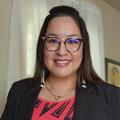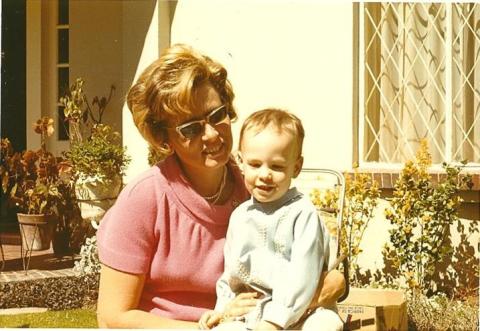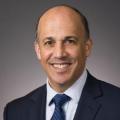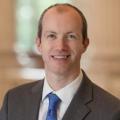


Advancing Lung Cancer Screening in Veterans Through Strategic Research
Read time: 4 minutes.
Lung cancer screening has the potential to save more lives than any other cancer screening tool, yet reports suggest only 10%–20% of eligible patients are screened each year.


BMW Berlin Marathon


Conversations that Count: Prostate Cancer Awareness
Read time: 4 minutes.
The LUNGevity Conversations that Count speaker series offers an opportunity to stay informed, engage in critical discussions, and learn from top experts revolutionizing lung cancer care for underserved populations. The series is intended for healthcare professionals, community health equity champions, and anyone interested in equitable access to healthcare.

Low-Dose Computed Tomography and Beyond: Advances in the Early Detection of Lung Cancer
Read time: 5 minutes.
Lung cancer screening has come a long way since low-dose CT (LDCT) scans first became available in 2015 in the United States. However, LDCTs can still miss some lung cancers while causing unnecessary anxiety with false positives. New research from the World Congress on Lung Cancer 2025 reveals how cutting-edge technologies and expanded screening approaches are transforming the early detection of lung cancer.


Biggest News in Early-Stage Lung Cancer Research from WCLC 2025
Read time: 2 minutes.
The annual World Conference on Lung Cancer (WCLC), organized by the International Association for the Study of Lung Cancer, is the largest global meeting dedicated to lung cancer research. WCLC 2025 showcased several important studies that focused on treating resectable (surgically removable) non-small cell lung cancer (NSCLC).




Breaking Down Barriers: Project ASCENT Boosts Lung Cancer Screening in Hispanic/Latin Communities
Read time: 2 minutes.
Lung cancer remains the leading cause of cancer death, and for many communities, barriers like culture, language, and access make lifesaving screening even harder to reach. A new study, Project ASCENT, shows how tailored, culturally sensitive approaches can make a difference.

Closing the Loop: Sharing Research Results Back with the Lung Cancer Community
Read time: 2 minutes.
When patients and caregivers participate in lung cancer research, they are generously offering their time, experiences, and personal stories to improve care for others. Yet too often, they never see the results of the studies they contribute to. This gap can discourage future participation and limit the diversity of voices represented in research.

Transforming Clinical Trials Initiative 2025 Third Quarter Updates
LUNGevity Foundation’s Transforming Clinical Trials Initiative (TCTI) develops collaborative strategies to enhance innovation and patient access to safe and effective lung cancer tools and treatments as quickly as possible.
Ryan Nguyen, DO

University of Illinois Chicago
Assistant Professor of Clinical Medicine

Understanding the Patient Experience in EGFR-Positive Lung Cancer
Over the past two decades, treatment for EGFR-positive lung cancer has transformed dramatically. The introduction of tyrosine kinase inhibitors (TKIs) has led to major improvements in survival for many patients. Yet, most of what we know about this disease still comes from clinical trial data—not from patients’ real-world experiences.
Richard Lewis Martin III, MD, MPH

Tennessee Oncology
Medical Director of Health Equity and Community Engagement

6 Tips for Managing Scanxiety
Read time: 4 minutes.
Scanxiety is a term used for the anxiety someone feels as a medical exam, like an MRI or CT scan, approaches. It can come with feelings of dread or worry, as well as “what if” thoughts focused on receiving bad news, like the return or growth of a cancerous tumor.
Eric K. Singhi, MD
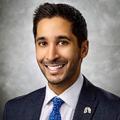
University of Texas MD Anderson Cancer Center
Assistant Professor and Thoracic Medical Oncologist
Jennifer W. Carlisle, MD

Winship Cancer Institute, Emory University School of Medicine

Conversations that Count: Bridging the Gap, Radon Pathways to Prevention
Read time: 3 minutes.
The LUNGevity Conversations that Count speaker series offers an opportunity to stay informed, engage in critical discussions, and learn from top experts revolutionizing lung cancer care for underserved populations. The series is intended for healthcare professionals, community health equity champions, and anyone interested in equitable access to healthcare.

Why Do Some People Who Have Never Smoked Get Lung Cancer?
Read time: 3 minutes.
As tobacco use has declined in recent years, we have seen a new demographic of lung cancer patients emerge. Lung cancer in individuals who have never smoked (LCINS) is becoming more common. These people are often younger women with no history of tobacco exposure.

Dose-Finding and US Representativeness under the Spotlight at the ODAC’s July 2025 Meeting
The US Food and Drug Administration (FDA) Oncologic Drug Advisory Committee (ODAC) met on July 17th, 2025 to review the results of clinical trials DREAMM-7 and DREAMM-8 assessing GlaxoSmithKline’s antibody-drug conjugate (ADC) belantamab mafodotin in two different combinations to treat patients with multiple myeloma (MM) in the second line. While both regimens demonstrated clinical benefit, the committee raised concerns about applicability of the trial results to the US patient population and the toxicity observed at the chosen dose.
LUNGevity Foundation Joins 2025 LungXperience Tour to Promote Lung Health and Early Detection Across the U.S.
Organization to Participate in 12 National Events as Part of Innovative Health Education Initiative

Exciting Early Detection Research is Underway
Read time: 2 minutes.
The likelihood of surviving five years or more after a lung cancer diagnosis is 27%.1 But if it is caught early, before spreading, the five-year survival rate jumps to 64%, and in some cases it is curable.1 Unfortunately, only 22% of lung cancer is diagnosed in the earliest stage of the disease.1 LUNGevity and Rising Tide for Clinical Cancer Research (RTCCR) are working to change this.
LUNGevity Foundation Awarded Funding to Launch Groundbreaking Citizen Scientist Program for Lung Cancer Community
Program builds pipeline of patients and caregivers trained to be directly involved in research

The Enduring Legacy of Lung Cancer Research Awards
Read time: 6 minutes.
Over the past 20 years, researchers have made tremendous strides in the early detection and treatment of lung cancer—early detection chest scans for high-risk populations, immunotherapies for early and advanced disease, and targeted therapies to personalize treatments for patients. The momentum is strong.

Leveraging Orphan Drugs for Lung Cancer Treatment
Read time: 4 minutes.
As a dedicated researcher and oncologist, Noura Choudhury, MD, at the University of Chicago, witnesses daily the urgent need for better treatments for lung cancer. She is passionate about finding the most efficient ways to help her patients—particularly those diagnosed with small cell lung cancer (SCLC).


Conversations that Count: Geriatric Oncology & Engaging the Elderly in Cancer Care
Read time: 2 minutes.
The LUNGevity Conversations that Count speaker series offers an opportunity to stay informed, engage in critical discussions, and learn from top experts revolutionizing lung cancer care for underserved populations. The series is intended for healthcare professionals, community health equity champions, and anyone interested in equitable access to healthcare.


2025 ASCO: Highlights of Lung Cancer Research
Read time: 9 minutes.
The annual meeting of the American Society of Clinical Oncology (ASCO) once again brought together nearly 50,000 members of the oncology community. From May 30 – June 2, researchers, oncologists, and patient advocates had first-hand access to the latest cancer research news.
Sanlan Cape Town Marathon


Understanding DTPCs: A Path to Ending Drug Resistance in Lung Cancer
Read time: 2 minutes.
When a person is treated for advanced-stage lung cancer, tumors will often shrink, and their symptoms may subside. An effective treatment will kill many tumor cells, but there are usually some cells (called drug-tolerant persister cells, or DTPCs) left behind. If these cancer cells survive treatment, they will eventually begin to grow again.

Committed to Cachexia: A Decade of LUNGevity Research
Read time: 4 minutes.
As the nation’s leading lung cancer nonprofit and member of the Cancer Grand Challenges Cachexia Team, LUNGevity has been working to improve our understanding and treatment of cachexia.

How the May 2025 ODAC Meeting Could Still Impact Future Lung Cancer Clinical Trials
The US Food and Drug Administration (FDA) Oncologic Drug Advisory Committee (ODAC) convened on May 20th and 21st to weigh in on four different regimens across a variety of cancer treatment modalities and indications. These discussions generated important considerations for developers of drugs and biologics for treatment indications across the oncology landscape, including in lung cancer. Read on for main themes, what it means for the lung cancer community, and how LUNGevity is addressing these considerations.

Sharing Experiences With EGFR Lung Cancer: A Tool Shaped by Patients and Caregivers
Read time: 3 minutes.
Why did we build a tool to visualize data collected from patients and caregivers?
Community members provide data but too often never see how their data was used. Research data is mostly published in medical journals written for researchers and scientists versus the general public. Also, medical journals require the public to pay for access.

Surviving LMD: Michelle Never Settled for “No”
Read time: 4 minutes.
Michelle knew what was wrong. She knew the headaches, regular vomiting, ear popping, and “whooshing” sounds in her head were all signs of leptomeningeal disease (LMD). The issue, however, is that LMD is so rare—only diagnosed in 5% of people with cancer—she had to advocate for the testing to prove it.

Integrative Oncology: Eastern Medicine Meets Western Health Care to Treat the Whole Person
Read time: 2 minutes.
Integrative oncology combines conventional cancer treatments with complementary therapies to provide comprehensive care. It focuses on treating the whole person—addressing physical and mental well-being.
Complementary therapies are treatments used alongside standard medical care, not as replacements. This approach emphasizes science-backed therapies to enhance quality of life and minimize side effects. Examples include:

Conversations that Count: Lung Cancer Screening in Asian Americans
Read time: 4 minutes.
The LUNGevity Conversations that Count speaker series offers an opportunity to stay informed, engage in critical discussions, and learn from top experts revolutionizing lung cancer care for underserved populations. The series is intended for healthcare professionals, community health equity champions, and anyone interested in equitable access to healthcare.


A Future of Unifying Cancer Science and Medicine: Highlights from AACR 2025
Read time: 9 minutes.
More than 22,000 cancer researchers from 81 countries got together for the annual American Association for Cancer Research (AACR) meeting in Chicago from April 25-30. This year’s meeting theme “Unifying Cancer Science and Medicine: A Continuum of Innovation for Impact” was a testament to AACR’s commitment to bridging the laboratory bench, the bedside, and the community.


Transforming Cinical Trials Initiative 2025 Second Quarter Updates
The Transforming Clinical Trials Initiative (TCTI) hit the ground running in 2025 to help develop novel solutions to complex challenges in the development of new tools and treatments for lung cancer. Your support drives us forward, ensuring we can collaboratively address pressing challenges and identify actionable solutions.

The Promise of PROTACs for Treating RET+ Lung Cancer
Read time: 3 minutes.
RET proteins are a type of receptor tyrosine kinase—an important group of signaling molecules in healthy cells. When RET proteins are turned “on” and “off” in healthy cells, they control the function of other proteins. This cascading effect allows the cells to manage important cellular functions such as cell growth through protein signaling pathways.

How Could Proposed Changes to Medicaid Affect People with Lung Cancer?
Read time: 3 minutes.
Congress is considering major changes to Medicaid as part of broader federal budget negotiations. This blog will walk you through the basics of Medicaid and how current proposals could impact the program.

Small Cell Lung Cancer: The Dial Is Starting to Move
Read time: 6 minutes.
The research community is finally beginning to gain traction and make real progress in treating small cell lung cancer (SCLC).

Conversations that Count: Using a Community Health Advisors Program to Address Cancer Disparities in the Deep South
Read time: 2 minutes.
The LUNGevity Conversations that Count speaker series offers an opportunity to stay informed, engage in critical discussions, and learn from top experts revolutionizing lung cancer care for underserved populations. The series is intended for healthcare professionals, community health equity champions, and anyone interested in equitable access to healthcare.

Irish Life Dublin Marathon


Conversations that Count: Patient Engagement Strategies to Advance Outcomes of Patients with Lung Cancer
Read time: 4 minutes.
The LUNGevity Conversations that Count speaker series offers an opportunity to stay informed, engage in critical discussions, and learn from top experts revolutionizing lung cancer care for underserved populations. The series is intended for healthcare professionals, community health equity champions, and anyone interested in equitable access to healthcare.



How Do We Treat Early-Stage NSCLC in 2025?
Read time: 3 minutes.
Roughly 20% of lung cancer is diagnosed as early-stage disease, and researchers have been working to improve treatment options for these patients—with significant success.

Conversations that Count: Transforming Lung Cancer Care Through Insight and Innovation
Read time: 4 minutes.
The LUNGevity Conversations that Count speaker series offers an opportunity to stay informed, engage in critical discussions, and learn from top experts revolutionizing lung cancer care for underserved populations. The series is intended for healthcare professionals, community health equity champions, and anyone interested in equitable access to healthcare.

Lung Cancer in Women: Why We Need to HearHer
Read time: 6 minutes.
“Even when the diagnosis is hard to accept, there is hope.”
This message resonates deeply with women across the world who are courageously speaking out about their lung cancer journeys—their voices amplified by the recently launched #HearHer campaign.

HOPE in Their Words: Reflections from Attendees
Read time: 2 minutes.
HOPE Summit is where lung cancer survivors and care partners come together to connect, learn, and thrive. It's a weekend filled with inspiration, knowledge, and a whole lot of hugs and high-fives. Learn more and check out the agenda here.

Laughs for Lungs: Rasheed Marshall Combines Comedy With Cancer
Read time: 2 minutes.
Rasheed Marshall understands the secondhand effects of cancer well. First his mom, Joycelyn, was diagnosed with breast cancer in 1995. It came back in 2015 and eventually metastasized (spread) to her lungs. Soon after, his brother-in-law Romain was diagnosed with brain cancer. They both passed away the same week.
Drs. Jessica Lin and Sandip Patel Join LUNGevity’s Scientific Advisory Board
Top researchers bring expertise to guide nation’s top lung cancer nonprofit

Staying Safe From Smoke, Pollution, and Dangerous Air Quality
On the West Coast, wildfires are taking human lives and destroying homes. On the East Coast, the devastating results of Hurricane Helene are leading to illegal open burning of debris and trash. Thousands of miles separate these fires, but the results are the same—dangerous particles are entering the air we breathe.
Sandip P. Patel, MD

University of California, San Diego
Medical Oncologist
Professor of Medicine
Jessica J. Lin, MD

Massachusetts General Hospital
Medical Oncologist
Harvard Medical School
Associate Professor of Medicine

Conversations that Count: Understanding the Complexities of Race and Health
Read time: 4 minutes.
The LUNGevity Conversations that Count speaker series offers an opportunity to stay informed, engage in critical discussions, and learn from top experts revolutionizing lung cancer care for underserved populations. The series is intended for healthcare professionals, community health equity champions, and anyone interested in equitable access to healthcare.
Intercept Lung Cancer Through Immune, Imaging & Molecular Evaluation-InTIME – Part 2
Lung cancer is the leading cause of cancer death globally, primarily due to challenges in early detection. With funding from Stand Up to Cancer, LUNGevity Foundation, and the American Lung Association, a multidisciplinary team called the Lung Cancer Interception Dream Team was formed in 2017 to tackle this challenge, uniting expertise from various fields to enhance lung cancer interception and prevention.
This initiative includes the development of a lung pre-cancer genome atlas (PCGA) aimed at understanding molecular changes linked to the progression of pre-cancerous lesions to lung carcinoma. With continued funding from LUNGevity Foundation and the American Lung Association, the team plans to establish a temporal atlas for premalignant lung adenocarcinoma by utilizing robot-assisted bronchoscopy to collect samples from patients with ground glass opacities (GGOs) suspected of lung cancer. This effort will not only help identify these lesions but also facilitate the targeted delivery of intervention agents.
By gaining insights into progression-associated molecular alterations and cellular interactions, the team aims to significantly advance lung cancer interception strategies - catching cancer at its earliest stages and treatment it before it grows and spreads. Ultimately, the goal is to provide personalized interception approaches for individuals at risk of developing lung cancer.
- Research Summary
Cancer interception is catching cancer at its earliest stages and treatment it before it grows and spreads. Our current lack of effective lung cancer interception methods stems from an incomplete understanding of the early molecular events in lung cancer development, Through the 2017 Stand Up To Cancer – LUNGevity Foundation – American Lung Association grant, a multidisciplinary team called the Lung Cancer Interception Dream Team has established the Lung Pre-Cancer Genome Atlas (PCGA), identifying immune and epithelial changes linked to who normal cells become pre-malignant cancer cells. With a second round of funding from LUNGevity Foundation and the American Lung Association, the team will be building on these foundational findings and enhance their efforts by developing a temporal atlas of genomic (DNA-level changes), transcriptomic (RNA-level), and epigenetic changes in pre-malignant lung adenocarcinoma lesions through longitudinal sampling. The team hypothesizes that these lesions exhibit specific genomic, transcriptomic, and epigenetic alterations, with some evading immune detection and advancing to invasive cancer. Ultimately, the insights gained will provide valuable resources for the research community and significantly impact early-stage lung cancer interception.
- Technical Abstract
We lack effective lung cancer interception approaches due to our incomplete understanding of the earliest molecular events associated with lung carcinogenesis, which leave clinicians with few tools to manage precancerous lesions that may be found on CT screening. Our multidisciplinary Lung Cancer Interception Dream Team has made significant progress in establishing a Lung Pre-Cancer Genome Atlas(PCGA) where we have begun to identify immune and epithelial alterations associated with premalignant disease progression. To extend our findings in order to refine targets for lung cancer interception trials, we are proposing to extend our on-going PCGA efforts with two important aims 1) Develop a temporal atlas of premalignant lung adenocarcinoma via establishment of a cohort of longitudinally-sampled ground glass opacities (GGOs) collected with robot-assisted bronchoscopy, representing premalignant and minimally-invasive lung adenocarcinomas and 2) based on our current findings and feedback from our previous reviewers, we will expand our profiling to include spatial and epigenetic profiling of precancerous lesions and minimally invasive carcinoma in biopsy samples collected from the GGO cohort and our Pre-Cancer Genome Atlas 2.0 cohorts. We hypothesize that premalignant lesions bear specific genomic, transcriptomic and epigenetic aberrations, and a subset of these lesions escape immune surveillance and progress to invasive cancer. Our team, will apply spatial profiling using imaging mass cytometry and spatial transcriptomics will allow us to uncover the tissue architecture of the molecular processes associated with progression which in turn will help delineate the cell-cell interactions underlying these processes. Epigenetic profiling via single cell ATAC and bulk DNA methylation sequencing will allow us to overlay information about transcriptional regulation with the other ‘omic data to better understand the regulation of processes associated with progression. Critical to the success of the proposal is the multidisciplinary expertise of the team, involvement of patient advocates and the extensive preliminary data supporting the feasibility of the proposed approaches. The insights gained from successful completion of this project and the data that will made available to the research community will serve as a foundational resource for other investigators in the field and will result in a significant and sustained impact on the interception of early-stage lung cancers.
LUNGevity Foundation Welcomes Strategic Visionaries Marci Allison and Brittany McKelvey, PhD

Treating Small Cell Lung Cancer: 2025 and Beyond
Read time: 2 minutes.
Researchers have been trying to find new ways to treat small cell lung cancer (SCLC) for a long time. Those efforts are starting to pay off in big ways.

Real-World Examples of Patient Involvement in Designing Clinical Trials
Read time: 2 minutes.
Here we present the final video in our three-part series about how patients and researchers can work together to develop clinical trials.

Developing Clinical Trials that Account for the Realities of Patient Life
Read time: 2 minutes.
We are pleased to continue our three-part series about how patients and researchers can work together to develop clinical trials.

Our Dream Was to Start a Family, but Lung Cancer Changed Everything
Read time: 6 minutes.
After a few unimpressive encounters I experienced in real life, I tentatively returned to the Match dating app. That’s where I stumbled upon a very sweet, kind-hearted, nerdy, and compassionate man. Then I met Nate (Ha! Just joking). It was Nate. We bonded so quickly during which we identified our life goals.
One goal was to have a family.
LUNGevity Issues Four RFAs in Support of the Lung Cancer Research Workforce
LUNGevity’s prized research awards are now accepting applications
LUNGevity Issues RFA for New Mid-Career “Bridge to Breathe” Research Award
Foundation is now accepting applications

The 5 Most Popular Lung Cancer Blogs From 2024
Read time: 3 minutes.
Throughout 2024 we published blogs sharing scientific meeting recaps, educational content, personal stories, treatment news, and so much more. Below are the most popular articles we published in 2024.

Research Milestones: Celebrating LUNGevity’s 2024 Research Awards
LUNGevity had a tremendous year supporting impactful research in 2024. In addition to our existing portfolio of ongoing research grants, we issued several new research awards in 2024. All of these awards are in strategic areas of research that are likely to move the dial for people living with lung cancer today and those who will be diagnosed in the future.
Below are more details about the research projects we recently announced funding for.

Giving Thanks: The People Who Drive Change and Progress
Read time: 5 minutes.
As a member of the lung cancer research, advocacy, and education space, we’re in a position to meet many dedicated and passionate individuals. While our day-to-day focus is on creating a better world for everyone affected by lung cancer, it’s the people we meet and connect with who are driving change and making real progress possible.

From Surgery to the Start Line: Katie Gilmore Runs Her First Marathon After Overcoming Lung Cancer While Pregnant
Read time: 5 minutes.
Endurance athletes have raised money for LUNGevity across the country, and recently, across the globe. We’ve celebrated researchers running the Big Sur International Marathon and family members completing the BMW Berlin Marathon. And next year, LUNGevity’s first time as an Official Charity Partner with the Schneider Electric Paris Marathon, we get to cheer on Katie Gilmore—a lung cancer survivor who was diagnosed while 12 weeks pregnant.
Justin Drake, PhD, Announced as Recipient of RETpositive/LUNGevity Research Award
Groundbreaking research goes beyond kinase inhibition to develop new approach for treating RET-positive cancers
Amy Cummings, MD, PhD, and Romel Somwar, PhD, Honored as Recipients of the Hamoui Foundation/LUNGevity Clinical Research Award
Innovative research brings hope for new approaches to treat RET-positive lung cancer

Celebrating 20 Years of Progress in Lung Cancer Research and Treatment
Read time: 5 minutes.
This year marks 20 years since researchers made a key discovery that changed the face of lung cancer research and treatment.
By uncovering EGFR’s role in lung cancer, researchers developed a new class of drugs—targeted therapies—designed to target specific mutations in lung cancer cells while leaving healthy cells unharmed.
Dwight Owen, MD, Receives Research Award for Innovative Approach to Overcoming Immunotherapy Resistance
Award lays the foundation for the next generation of immunotherapy breakthroughs
Epigenetic Alterations in Blood as Markers for Early Lung Cancer Detection
The objective of this project is to develop a blood test that can improve upon current limitations in lung cancer screening. Dr. Patel and his team have developed a method to accurately measure alterations in DNA that are cancer-specific by looking at levels of methylation of circulating tumor DNA (ctDNA) in the bloodstream. Using this method, Dr. Patel will develop a predictive model to identify patients with lung cancer based on these DNA alterations at a single time point, as well as an algorithm that can track these changes in a patient’s DNA over time. If successful, this could help detect lung cancer earlier in its development, thereby leading to better outcomes for patients.
- Research Summary
Lung cancer is by far the most deadly cancer in the U.S., with total lung cancer deaths exceeding those of the next three major cancers combined. Such dismal statistics are largely attributable to the insidious nature of the disease; by the time symptoms appear, the cancer has often spread to an extent that makes cure unlikely or impossible. In contrast, patients who are diagnosed at earlier stages have much better outcomes, as their tumors can be entirely removed or eradicated prior to distant spread. Thus, annual chest CT scans for lung cancer screening have proven to be effective at reducing lung cancer deaths, and are currently recommended for patients with a heavy smoking history. However, CT-based screening programs have been practically challenging to implement, and uptake has been slow. An alternative screening approach that has been garnering much enthusiasm is based on development of a simple blood test that detects DNA fragments shed from tumor cells into the bloodstream. Several commercial and academic groups have been racing to develop blood tests for cancer screening based on this concept, and the field has made impressive progress. However, detection of early-stage lung cancers has remained particularly challenging, with sensitivities reaching only ~20-40% for Stage I disease. A key limitation for detection of small, early-stage tumors has been the extremely low abundance of DNA fragments bearing cancer-specific features (such as mutations) in the circulation. To overcome this limitation, our group has developed a technology that can accurately measure cancer-specific alterations in DNA which are more highly abundant (known as “hypermethylation”). In the current project, we propose to develop a predictive model to identify patients with lung cancer based on probabilities inferred from measurement of these DNA alterations. We will then further improve the sensitivity for detecting the earliest stages of lung cancer by developing an algorithm that tracks longitudinal changes in a patient’s DNA signal over time rather than relying on just a single time-point.
- Technical Abstract
Early detection of cancer has long been one of the grand challenges of medicine. It is widely acknowledged that better methods for detection of small, asymptomatic tumors are likely to translate to substantial improvements in cancer survival rates. This is an especially important priority for lung cancer because of its high incidence, high rate of late-stage diagnosis, and high mortality. Over the past decade, liquid biopsy approaches based on detection of cancer-specific mutations or epigenetic changes in cell-free DNA (cfDNA) have made significant inroads towards this goal. However, detection of early-stage lung cancer has been particularly challenging because of the minute amounts of tumor DNA shed into blood. Methylation of cfDNA has emerged as a biomarker of choice for many early detection efforts, but existing technologies are designed to probe for cancer-specific methylation patterns either at pre-specified target sites or across broad genomic regions. The former approach prioritizes a limited subset of cancer-relevant signals, whereas the latter approach yields sparse cancer signals from extensive sequence data. Our group has developed a liquid biopsy technology that comprehensively profiles hypermethylated promoter sequences in cfDNA arising from anywhere in the genome. Using a high-stringency capture strategy based on methylation density rather than sequence, our method is able to globally profile hypermethylated promoters without pre-specifying targets. Gene silencing via promoter hypermethylation is a fundamental mechanism of carcinogenesis, and this aberrant signal can be detected at very low levels in plasma because background methylation patterns in healthy plasma are remarkably consistent. To optimize sensitivity for detection of early-stage lung cancer, we will develop a scoring scheme based on probabilistic machine learning to predict the likelihood of lung cancer by integrating hypermethylation signals across thousands of cell-free DNA fragments. Unlike most current liquid biopsy-based early detection efforts which are focused on identifying individuals with cancer based on a single time-point measurement, here we propose to develop a longitudinal early detection algorithm based on measurement of serial increases in cancer-specific epigenetic signals over time due to tumor growth and accumulating changes in the epigenome.
Novel Protein Degraders for Treating RET Positive Cancer
This project will investigate novel protein degraders (called PROTACs) as a treatment for RET-positive cancers, and will evaluate their efficacy in vitro and in vivo in prostate and lung cancer. PROTACs are highly specific molecules that degrade unwanted or harmful proteins in cells (in this case, RET tyrosine kinase). This research aims to provide a novel therapeutic approach targeting RET signaling, which could overcome resistance to existing RET inhibitors. If successful, it would be a first-in-class compound for further clinical development.
- Research Summary
RET receptor tyrosine kinase is a proto-oncogene that requires a co-receptor and secreted ligand for activation. Activating RET mutations are oncogenic targets in non-small cell lung cancer, medullary thyroid cancer and neuroendocrine type cancers. Two RET-specific kinase inhibitors (BLU-667 and LOXO-292) have been FDA approved for treating RET fusion positive cancers. This has led to a tremendous advance in lung cancer therapy and objective response rates in patients naïve to RET inhibitors or who have received other RET inhibitors such as cabozantinib or vandetanib. It is also apparent that RET therapy-driven resistance is common and new alternatives are needed to drug this pathway. Our hypothesis is that targeting RET with novel, first-in-class RET degraders will result in cell death that is more durable than existing inhibitors of RET kinase activity. We will test these novel degraders on several models of prostate and lung cancer to assess on target RET degradation and efficacy in cell line and mouse models. Once novel RET protein degraders are developed and tested in prostate and lung cancer models in vitro and in vivo, we plan to perform pre-clinical optimization studies of compounds and work towards clinical implementation in late stage prostate, lung, and other cancers that rely on RET signaling for survival.
- Technical Abstract
Two RET-specific kinase inhibitors (BLU-667 and LOXO-292) have been FDA approved for treating RET fusion positive cancers. This has led to a tremendous advance in lung cancer therapy and objective response rates in patients naïve to RET inhibitors or who have received other RET inhibitors such as cabozantinib or vandetanib. It is also apparent that RET therapy-driven resistance is common and new alternatives are needed to drug this pathway. Our hypothesis is that targeting RET with novel, first-in-class RET degraders will result in cell death that is more durable than existing inhibitors of RET kinase activity. We will test hypothesis via the following specific aims: Aim 1. Development and characterization of RET degraders for treating RET positive cancers and Aim 2. Evaluate efficacy of RET degraders in in vitro and in vivo NEPC models. In aim 1, we propose to develop RET degraders based on a new RET inhibitor, vepafestinib, and assess RET degrader specificity and activity using a panel of prostate and lung cancer cell line models that overexpress RET or contain RET fusions. We will then evaluate the efficacy of our RET degrader in in vitro and in vivo models of lung and prostate cancer. Once these novel RET protein degraders are developed and tested, we plan to perform pre-clinical optimization studies of compounds and work to identify a suitable pharma partner to develop for clinical implementation in late stage prostate, lung, and other cancers that rely on RET signaling for survival.
Developing new therapeutic approaches for RET-positive cancers
This project aims to develop new therapeutic approaches for RET-positive cancers, focusing on overcoming resistance to currently available RET inhibitors. Dr. Somwar and colleagues will investigate ways to block the growth of lung cancers with altered RET in a pathway called MAPK (mitogen activated kinase), which is involved in many biological processes involving cell growth and survival. MAPK is implicated in developing resistance to RET inhibitors and finding strategies to target this pathway in combination with RET could benefit many patients who have no approved therapy options after tumor reoccurence.
- Research Summary
Lung cancers are one of the leading causes of death in the US. Significant progress has been made over the past three decades to understand the biology of lung cancers and to stratify these diseases into subsets of patients who will get the maximum benefit of a given form of therapy. New technologies now allow for each patient to have their tumor DNA sequenced to find genetic causes of their cancer. Many genes that regulate cell growth are altered by mutations that cause the unrestricted growth that lead to cancer. Scientists have developed strategies to take advantage of these aberrant genes by finding chemicals or biological agents that will antagonize the protein products of these genes. One gene that is altered in 2% of lung cancers is called RET and there are two drugs that block the tumorigenic function of this cancer-causing gene (oncogene). Although patients respond very well to these two anti-RET drugs at first, they soon become resistant to the therapeutic effects. Additional genetic changes in RET or other genes in the cancer cells that regulate growth are responsible for the drug resistance. Our goal in this grant proposal is to find ways to block the growth of lung cancers with altered RET that stopped responding to anti-RET inhibitors. The strategy that we will test involves the simultaneous inhibition of RET and other proteins in another growth promoting pathway called the MAPK (mitogen activated kinase) pathway. We believe that this therapeutic strategy can benefit more than 30% of patients who stop responding to current drugs that target lung cancers with RET genetic alterations.
- Technical Abstract
RET fusions result from abnormal rearrangements of the kinase domain of RET with other non-essential genes and drive tumorigenesis. These oncogenic chimeric tyrosine kinases are found in approximately 2% of non-small cell lung cancer (NSCLC).Two FDA-approved selective RET inhibitors (selpercatinib and pralsetinib) have shown great response rates in lung cancer patients. However, resistance to RET inhibitors inevitably occurs, limiting therapeutic benefit. Multiple mechanisms of resistance to RET inhibitors have been described, including acquired RET solvent front mutations (G810R/S/C/V), and RET-independent mechanisms of resistance due to amplifications of other receptor tyrosine kinases (RTK) including MET, FGFR1 and ERBB2, and alterations in the RAS-MAPK pathway. Some second-generation RET inhibitors that target secondary RET mutations have been recently developed including vepafestinib (TAS0953/HM06) which is currently being tested in phase I/II clinical trials in the US and Japan for RET fusion positive lung cancer. There is a clinical need to identify mechanisms of resistance to vepafestinib and develop strategies to overcome them.
RET with solvent front mutations, amplification of MET/FGFR1/ERBB2 and RAS-MAPK pathway mutations account for >30% of all resistance mechanisms to first-generation RET drugs, and importantly, all of these alterations are expected to activate the RASMAPK pathway. Therefore, a therapeutic strategy that tackles RAS-MAPK pathway activation is expected to benefit >30% of patients who acquire resistance to first-generation RET drugs. Moreover, given that RET fusions, like all tumors arising from activated RTKs engage the RAS-MPAK pathway for oncogenesis, we believe that many treatment-naïve patients may also benefit from a therapeutic strategy that targets RET and the RAS-MAPK pathway.
Our first goal in this proposal is to simultaneously address resistance due to RAS-MAPK pathway alterations and extending the benefit of first-generation RET drugs by developing a combination therapy strategy involving RET and pan-RAS, MEK1/2 or ERK1/2 inhibitors. Our second goal is to decipher mechanisms by which the transcription factor capicua (CIC) regulate RET-driven tumorigenesis and resistance to RET inhibitors. We will perform transcriptomic, epigenic and proteomic profiling to gain insights into RET-ERK-CIC interaction. Our third goal is to identify and target resistance mechanisms to vepafestinib, so that a therapeutic strategy will be in place for when patients being treated with this drug develop resistance.
Our team includes leaders in the field of lung cancer clinical and translation research who have been at the forefront of lung cancer genomics and therapy, developing state of the art therapeutic strategies. We are well positioned to translate the findings from this study to the clinic within two years. These studies have the potential to benefit more than 30% of lung cancer patients with RET fusions.
Immunogenic peptide priming of dendritic cells for RET+ NSCLC
This project will explore the use of neoantigens to evaluate immunogenic priming of dendritic cells (DC) in RET+ NSCLC. Neoantigens are short protein fragments present only in cancer cells that bind to genetically encoded proteins known as human leukocyte antigens (HLA). Dr. Cummings will use features of HLA to predict which cancer-specific protein fragments best match an individual’s immune system, utilizing a biobank of RET-rearranged NSCLC biospecimens. This approach could help identify optimal immunogenic targets, that could be translated into a pathway for clinical use of personalized DC vaccines.
- Research Summary
RET-rearranged non-small cell lung cancer (NSCLC) is a rare subtype of lung cancer that is driven by growth signals triggered by RET activation. RET-specific inhibitors are effective initially, but most benefit from this treatment for only 1-2 years before additional treatment is needed. Chemotherapy is a widely-available option but typically provides less than six months of benefit, and it is unclear whether immunotherapy alone or in combination with chemotherapy is a better option. Findings from other gene-rearranged NSCLC studies, particularly those on ALK-rearranged NSCLC, suggest that immunotherapy works better when the immune system is better exposed to abnormalities created by the gene-rearrangement. These are neoantigens, or short protein fragments present only in cancer cells that bind to human leukocyte antigen (HLA), a scaffold that displays these protein fragments to the immune system. One issue with this approach is that these fragments have to be specifically matched to the immune system of an individual, and even the most common forms of HLA are only found in 20% of people. This means that these types of approaches would be applicable to at most 1 out of 5 people with RET-rearranged NSCLC. Our techniques broaden this approach by using features of HLA to predict which cancer-specific protein fragments best match an individual’s immune system (motif neoepitopes), including neoantigens from RET rearrangements and those predicted from the individual’s tumor. We propose to use our biobank of RET-rearranged NSCLC biospecimens, which have not been previously analyzed, to determine whether we can detect and elicit enhanced immune responses with motif neoepitopes, neoantigens related to RET-rearrangements, or other predicted neoantigens. We can then offer this approach in a currently open clinical trial investigating immune system optimization through an application to the FDA.
- Technical Abstract
RET-rearranged non-small cell lung cancer (NSCLC) presents challenges in management following progression on selective tyrosine kinase inhibitors (TKIs). Platinum-based chemotherapy and docetaxel are available options but are without durable benefit. Real world data with single-agent and combination chemo-immunotherapy suggests modest benefit and possible efficacy if immunotherapy-based approaches are appropriately optimized. For the past decade, our group has meticulously curated hundreds of NSCLC biospecimens including matched tissue and blood from multiple timepoints, including 7 RET-rearranged NSCLC cases that have not previously been analyzed. We have extensive expertise in neoepitope prediction and personalized immunotherapy through dendritic cell (DC)-based vaccination. Our most recent collaboration enabled functional assessments of T-cells through nanovial-based affinity repertoires, further enhancing our ability to predict and translate immunogenic peptides through a personalized vaccine-based program. We propose to use our RET-rearranged NSCLC biospecimens to systematically study T-cell-specific responses to identify optimal immunogenic peptide targets, an approach that could be translated in our currently open and approved DC vaccination trial (NCT03546361) through single patient exemptions.
Targeting tumor associated macrophages in immunotherapy resistant NSCLC
This project will investigate the role of cells called macrophages, key components of the immune system that have multiple functions, including immune surveillance within a unique communication pathway called hedgehog (Hh). The hedgehog signaling pathway is involved in cell growth and differentiation, as well as maintenance of stem cells and tissue repair. Disruption or inhibition of Hh can create an environment that is less favorable for survival of cancer cells, allowing a patient’s immune system to combat it more effectively. This research has the potential to benefit patients who have been diagnosed with NSCLC, who have not responded to current treatments including immunotherapy by boosting the body’s own defense mechanisms.
- Research Summary
Lung cancer remains one of the most lethal types of cancer worldwide, with non-small cell lung cancer (NSCLC) accounting for a majority of cases. The goal of our research is to better understand the relationship between certain immune cells called macrophages and NSCLC, and how this interaction contributes to the cancer's survival and resistance to treatment. The scientific premise of our project lies in investigating a unique communication pathway known as hedgehog signaling within these macrophages and determining how it impacts the immune system's ability to fight lung cancer. If successful, our research has the potential to benefit patients who have been diagnosed with NSCLC, particularly those who have not responded to current treatments including treatment with immune therapies. By disrupting the hedgehog signaling pathway in macrophages, we hope to create a tumor immune environment that is less favorable for cancer cell survival, allowing patients' immune systems to effectively combat the disease. This research can pave the way for innovative therapeutic approaches that boost the body's own defense mechanisms.
- Technical Abstract
The prognosis for patients with metastatic non-small cell lung cancer (NSCLC) remains poor despite recent progress in immune checkpoint blockade (ICB) therapy. Thus, there is an urgent need to understand mechanisms for lung cancer immune evasion within the tumor microenvironment (TME) in order to develop more effective and durable strategies for treating lung cancer. Tumor associated macrophages (TAMs), a major component of the tumor stromal mass, generally display an anti-inflammatory phenotype and can facilitate tumor growth by promoting angiogenesis, invasion, and metastasis, as well as immune evasion. However, it remains largely undefined exactly how these TAMs regulate anti-tumor immune responses within the TME. Will test the hypothesis that hedgehog signaling in TAMs interferes with recruitment of CD8+ T cells to the TME through the following specific aims: 1) Investigate the role of Hh inhibition with anti-PD-L1 therapy in non-small cell lung cancer; 2) Study the impact of Hh inhibition on TAMs and changes within the TME. The objective of this project is to understand signals required for functional polarization of TAMs within the TME and its contributions to immune cell dysregulation and cancer progression, and whether combined Hh inhibition and ICB can overcome resistance to immunotherapy.
Developing EGFRxHER3 bispecific CAR-T cells for targeting EGFR TKI DTPCs
In patients with EGFR-mutant NSCLC, tyrosine kinase inhibitors (TKIs) have been an effective treatment, but over time these patients develop resistance to TKIs, leading to tumor relapse. Dr. Yang’s project focuses on cancer cells called drug-tolerant persisters (DTPs), which are implicated in TKI resistance. A gene called HER3 is expressed in DTPs, and Dr. Yang will use specially engineered immune cells, called CAR-T cells, to target both HER3 and EGFR simultaneously. If successful, this approach would result in a bi-specific CAR-T cell that can be further evaluated in clinical trials.
- Research Summary
In lung cancer patients with a specific genetic mutation in EGFR, certain drugs can be helpful, but over time, the cancer can learn to resist these drugs, making them less effective. We're focusing on a small group of tough cancer cells, called DTPCs, that survive the initial treatment because they might be the key to curing the cancer for good. We've noticed that a gene called HER3 is expressed more in these cells. We also have promising results from CAR-T cell therapy. It is a treatment using T cells, a type of immune cells, engineered with the chimeric antigen receptor (CAR) so they can find and destroy cancer cells. We've found that CAR-T cells targeting EGFR can kill DTPCs. We believe if we use these T cells to attack both HER3 and EGFR at the same time, we might have a better chance of killing off these stubborn cancer cells. To make sure this idea works, we'll first check if HER3 is indeed more expressed in these DTPCs in the lab and samples from patients. Then, we'll test our HER3-targeting CAR-T cells to see if they can kill these DTPCs. If that looks promising, we'll tweak the T cells to target both HER3 and EGFR and see if they work even better. If all goes well, we'll be able to make one of the first effective CAR-T cells to target both HER3 and EGFR and try them out in clinical trials.
- Technical Abstract
In NSCLC patients harboring mutant EGFR, treatment with tyrosine kinase inhibitors (TKIs) has demonstrated efficacy. However, the emergence of resistance to EGFR TKIs remains a significant challenge, leading to disease progression. Targeting drug-tolerant persister cells (DTPCs), a rare subpopulation surviving initial treatment, emerges as a more effective strategy than awaiting the development of complete drug resistance, holding potential for curative cancer therapy. Based on our preliminary data on the upregulation of HER3 in DTPCs resistant to EGFR TKIs and the potent antitumor activity of EGFR-targeting chimeric antigen receptor (CAR)-T cells against DTPCs. We propose that HER3 is a promising target expressed on EGFR-TKI DTPCs and that CAR-T cells simultaneously targeting both EGFR and HER3 are an effective approach for targeting DTPCs with improved overall efficacy. In this proposal, we will evaluate HER3 as a therapeutic target for CAR-T cell therapy against EGFR-TKI DTPCs by validating its expression in DTPCs using in vitro cell models, in vivo xenograft and PDX models, and patient tissues. Additionally, we will evaluate the anti-tumor activity of HER3-targeting CAR-T cells against DTPCs. Subsequently, we will develop and characterize EGFRxHER3 bispecific CAR-T cells, evaluating their CAR expression, antigen binding affinity, and anti-tumor activity. We next will assess their anti-tumor efficacy in xenograft and PDX models to guide the selection of the most promising bispecific CAR-T cells for further development. If completed successfully, we will have EGFRxHER3 bispecific CAR-T cells ready for GMP-compliant clinical-grade CAR manufacturing, in preparation for clinical trial evaluation.
Building Reliable Oncology Navigation to Ensure Adjuvant Management: BRONx-TEAM Project
The introduction of targeted therapies and immunotherapy for early-stage lung cancer is associated with improved survival, but patients can only benefit if they partake in adjuvant and neoadjuvant therapies. Data has shown that inequalities exist for patients with lower socioeconomic status as well as non-White patients when it comes to being referred for and receiving treatment after surgery. These inequalities are likely to increase as new drugs are developed in clinical trials comprised of predominantly white patients. In this project, Dr. Nobel will study the impact of disparities on uptake of adjuvant therapy for NSCLC in a largely minority patient population at Montefiore Medical Center in Bronx, NY. She will provide social support and health literacy to engage patients in their care and collect genetic data about their tumors, which will contribute to future clinical trials that are more inclusive.
- Research Summary
Systemic therapy after surgery to remove lung cancer has been demonstrated to improve survival. However, data has shown that there are inequalities in which patients are referred for and receive treatment after surgery, specifically for lower socioeconomic status and non-White patients. As new treatments have been developed, these inequalities are likely to increase as these drugs have been developed in clinical trials predominantly composed of White patients and the benefits in other populations are not known. We have previously demonstrated that using nursing and peer navigators to help guide patients in their cancer care improves treatment adherence in our predominantly Black and Hispanic low socioeconomic status population in the Bronx. The BRONx-TEAM project aims to improve patient outcomes by using a navigation pathway focused on increasing patient adherence to systemic therapy after surgery for non-small cell lung cancer resection. We believe that by providing social support and improving health literacy we can get patients to be more informed and engaged in their cancer care. Furthermore, we will gather genetic data about the patients tumors. Given our patient population, we have a unique opportunity to contribute to the literature to understand the relationships between tumor genetics, treatment types and outcomes in non-White patients. Furthermore, we will investigate the use of a commercial genetic panel to assess risk for recurrence. Given the lack of this type of data in low income non-White patients, we believe that this exploratory portion of our study will serve as an important foundation for future clinical trials that are more inclusive than the currently available literature.
- Technical Abstract
As seen in the phase III trial CheckMate 816 (CM816), neoadjuvant anti-PD-1+chemotherapy improves survival for patients with resectable non-small cell lung cancer (NSCLC), with pathologic response as a major trial endpoint. Our team led the Central Pathology Review for CM816, and we showed the first prospective evidence that the full spectrum of % residual viable tumor (%RVT) associates with event free survival. Given the data supporting pathologic response as a survival surrogate, %RVT will likely be incorporated into the next generation of clinical trials and may ultimately guide clinical decision-making. %RVT is primarily evaluated using visual assessment of routine hematoxylin and eosin-stained slides. We developed a machine learning-based approach to score %RVT, which allows for a standardized approach that can be completed rapidly for a large volume of patients, and we propose to test this algorithm in resection specimens from CM816. Additionally, we will use multiplex immunofluorescence (mIF) to quantify individual features of pathologic response, locate them within the larger tumor bed, and determine the relative contribution in predicting patient outcomes. Furthermore, we will use the novel AstroPath platform, a mIF whole-slide imaging platform that uses algorithms first developed in astronomy to generate tumor-immune maps, to identify additional pre- and on-treatment biomarkers of response. Our goal is to leverage emerging technologies (i.e, machine learning and mIF) to develop the next generation of pathology biomarkers, including pathologic response assessment, and to identify additional features that can potentially be targeted in combination with anti-PD-(L)1+chemotherapy to improve clinical benefit in patients with NSCLC.
Next-generation pathologic response assessment in patients with lung cancer
Dr. Deutsch’s proposal centers around finding better pathologic predictors of response to neoadjuvant IO in early stage NSCLC. She will utilize machine learning/artificial intelligence to test an algorithm that she and her team have developed that assesses percent residual viable tumor (%RVT), which is the amount of tumor left at the time of surgery. Dr. Deutsch will also characterize tissue specimens using a novel immunofluorescence platform to identify cell types and spatial relationships that are associated with patient benefit to immunotherapy+chemotherapy. This approach can help inform which patients should receive a given therapy, how they will respond, and additional possible targets for the development of new therapies.
- Research Summary
Immunotherapy revolutionized the treatment of lung cancer, and is now being extended so patients can receive therapy before surgery. This was supported by a large clinical trial, CheckMate 816 (CM816), where patients with lung cancer showed improved survival when treated with immunotherapy+chemotherapy before surgery, compared to chemotherapy alone followed by surgery. However, there is an unmet need to identify who is most likely to benefit from such an approach. To address this gap, we will apply novel, next-generation pathology biomarkers utilizing machine learning/artificial intelligence and multispectral imaging. Specifically, we have shown that the amount of tumor left at the time of surgery, termed percent residual viable tumor (%RVT), predicts survival. To date, %RVT assessment is primarily performed visually on glass slides using a light microscope. We developed a machine learning-based algorithm for assessing %RVT on digitized glass slides using a small cohort of patients at Johns Hopkins to improve standardization and throughput in preparation for broad usage. Here, we will test the algorithm’s performance in a larger cohort of patients (the CM816 patients). Additionally, we will characterize tissue specimens using the novel multiplex immunofluorescence AstroPath platform, which uses algorithms first developed in astronomy, to identify cell types and spatial relationships that are associated with patient benefit to immunotherapy+chemotherapy. Our goal is to use cutting-edge technologies to improve the care of lung cancer patients by informing which patients should receive a given therapy, how well patients will do after receiving therapy, and possible additional targets for the development of new therapies.
- Technical Abstract
As seen in the phase III trial CheckMate 816 (CM816), neoadjuvant anti-PD-1+chemotherapy improves survival for patients with resectable non-small cell lung cancer (NSCLC), with pathologic response as a major trial endpoint. Our team led the Central Pathology Review for CM816, and we showed the first prospective evidence that the full spectrum of % residual viable tumor (%RVT) associates with event free survival. Given the data supporting pathologic response as a survival surrogate, %RVT will likely be incorporated into the next generation of clinical trials and may ultimately guide clinical decision-making. %RVT is primarily evaluated using visual assessment of routine hematoxylin and eosin-stained slides. We developed a machine learning-based approach to score %RVT, which allows for a standardized approach that can be completed rapidly for a large volume of patients, and we propose to test this algorithm in resection specimens from CM816. Additionally, we will use multiplex immunofluorescence (mIF) to quantify individual features of pathologic response, locate them within the larger tumor bed, and determine the relative contribution in predicting patient outcomes. Furthermore, we will use the novel AstroPath platform, a mIF whole-slide imaging platform that uses algorithms first developed in astronomy to generate tumor-immune maps, to identify additional pre- and on-treatment biomarkers of response. Our goal is to leverage emerging technologies (i.e, machine learning and mIF) to develop the next generation of pathology biomarkers, including pathologic response assessment, and to identify additional features that can potentially be targeted in combination with anti-PD-(L)1+chemotherapy to improve clinical benefit in patients with NSCLC.
Dr. Abhijit Patel Receives 2024 Lung Cancer Early Detection Award from LUNGevity and Rising Tide Foundations
Research award supports transformative early detection technology to increase lung cancer-related survival rates
United Airlines NYC Half


Bringing the Underserved LGBTQIA2S+ Community into the Lung Cancer Spotlight
Updated: June 10, 2025
Editor's Note: This important research project is already yielding many tangible results, including being published in the Annals of the American Thoracic Society, a respected, peer-reviewed journal. You can read the abstract of the research paper or dig into the conversation below to learn more about lung cancer screening in marginalized communities.

Advocacy 101: Patient and Self-Advocacy
Read time: 3 minutes.
This video covers the final part of our 3-Part Advocacy 101 series—Patient and Self-Advocacy. The LUNGevity Action Network is joined by advocate and survivor Aurora Lucas, oncology nurse navigator Kathleen Gamblin, as well as LUNGevity care navigator and social worker Angela James, to talk about becoming an effective patient or self-advocate.
Make sure to check out the entire Advocacy 101 series:
LUNGevity Foundation and Living Beyond Breast Cancer Partner to Bring the No One Missed Campaign to the Breast Cancer Community
The collaborative effort drives awareness about biomarker testing to the metastatic breast cancer community
LUNGevity Partners with Sean Swarner for Global Awareness Campaign
Elite Athlete Raising Awareness for Lung Cancer Through The Great World Race

Sean Swarner's Great World Race: Raising Awareness for Lung Cancer
Read time: 4 minutes.
From keynote speaker to key athlete, Sean Swarner headlined LUNGevity’s HOPE Summit in May and is now set on completing his next unbelievable feat—completing the Great World Race this November by running seven consecutive marathons, one on each continent.

Brain Mets Basics for NSCLC: What Are Brain Metastases and How Do We Treat Them?
Read time: 2 minutes.
Brain metastases (also called brain mets) develop when cancer from somewhere else in the body spreads to the brain.
LUNGevity Launches "Anyone with Lungs Can Get Lung Cancer" Campaign for Lung Cancer Awareness Month 2024
Lung Cancer Statistics - LP block
Raise Awareness
Get the facts and share them. Help raise awareness and dispel the myths and stigma.

What You Need to Know About Changes to Medicare Part D in 2025
Two important changes are coming for Medicare Part D beneficiaries in 2025 as a result of the Inflation Reduction Act:

Screening and Early Detection of Lung Cancer: Highlights from WCLC and ESMO 2024
Lung cancer screening and early detection were major topics of discussion at the World Conference on Lung Cancer (WCLC), held in San Diego from September 7-10, and the European Society for Medical Oncology (ESMO) conference in Barcelona from September 13-17. This fourth and final blog in our series of updates summarizes highlights from these discussions.
You can read the other update blogs from these fall science meetings:
Drs. Julie Deutsch, Tamar Nobel, and Yan Yang Receive LUNGevity’s Prestigious Career Development Awards
Awards provide essential support for promising lung cancer researchers early in their careers

Early-Stage and Locally Advanced Non-Small Cell Lung Cancer: Highlights from WCLC and ESMO 2024
This is the third recap blog in our series of updates from the World Conference on Lung Cancer (WCLC), held in San Diego from September 7-10, and the European Society for Medical Oncology (ESMO) conference, held in Barcelona from September 13-17. This update focuses on early-stage and locally advanced non-small cell lung cancer (NSCLC).
You can read the other update blogs from these fall science meetings:

Small Cell Lung Cancer: Highlights from WCLC and ESMO 2024
This is the second blog in our series of updates from the World Conference on Lung Cancer (WCLC), held in San Diego from September 7-10, and the European Society for Medical Oncology (ESMO) conference, held in Barcelona from September 13-17. This update focuses on small cell lung cancer (SCLC), which is seen in 15% of people diagnosed with lung cancer.
You can read the other update blogs from these fall science meetings:
LUNGevity Foundation Partners with American Lung Cancer Screening Initiative to Amplify Lung Cancer Screening Awareness

Metastatic Non-Small Cell Lung Cancer: Highlights from WCLC and ESMO 2024
This year, the first three weeks of September were packed with lung cancer research updates at the World Conference on Lung Cancer (WCLC) from September 7-10 in San Diego followed by the European Society for Medical Oncology (ESMO) conference from September 13-17 in Barcelona.

We're Back! Q&A With Breathe Deep TOGETHER Team Captains
Jeff & Stephanie Smith
Breathe Deep TOGETHER New York City
How has lung cancer impacted your life?

Lung Cancer Survivors are Excited: ILCSC24 is Finally Here!
Read time: 2 minutes.
Editors Note: If you missed the International Lung Cancer Survivorship Conference (ILCSC) on September 20-21, you can still register and watch recordings of sessions here.

Finding Help in the LGBTQIA2S+ Lung Cancer Community
Read time: 3 minutes.
This collection of resources was specifically created to help people who are part of the LGBTQIA2S+ community and living with lung cancer. Some of the resources below are specific to lung cancer, while others are relevant to people with all types of cancer.

Eating Healthy on the Mediterranean Diet
Read time: 3 minutes.
Oncology dietitian Lori Bumbaco takes us on a culinary journey, exploring why experts consistently rank the Mediterranean diet as the number one choice for healthy eating. In addition to the studied health benefits, Lori highlights the unique foods and flavors that make this diet special and provides simple, practical tips on how to incorporate them into your daily meals.

Meet the College Students Raising Awareness for Lung Cancer and Lung Cancer Screening
Read time: 4 minutes.
Editor's Note: This article has been updated for 2025 as LUNGevity and ALCSI continue their partnership for Lung Cancer Awareness Month.
Anyone with lungs can get lung cancer, and everyone with lungs can raise awareness this November for Lung Cancer Awareness Month.

How Do Drugs Get Approved (and Fast-Tracked) by the FDA?
Read time: 5 minutes.
This is Part 3 in our series on how drugs get approved to treat lung cancer.

FDA Approves New Immunotherapy Option for Early-Stage NSCLC
On August 15, 2024, the US Food and Drug Administration (FDA) approved a new treatment regimen for people newly diagnosed with early-stage, resectable (able to be removed by surgery) non-small cell lung cancer (NSCLC) whose tumors do not have known EGFR mutations or ALK rearrangements.
The recent approval offers another immunotherapy-based treatment regimen for people with stage IIA-IIIB NSCLC—the combination of durvalumab (Imfinzi®) with chemotherapy before surgery, followed by durvalumab after surgery.

New Chemotherapy-Free Treatment Combination Approved for EGFR+ Lung Cancer
On August 19, 2024, the US Food and Drug Administration (FDA) approved a new treatment option for people newly diagnosed with locally advanced or metastatic non-small cell lung cancer (NSCLC) whose tumors have EGFR exon 19 deletions or exon 21 L858R mutations.
The recent approval offers a new chemotherapy-free treatment for patients—the combination of lazertinib (Lazcluze™) with amivantamab-vmjw (Rybrevant®).


Understanding Clinical Trials: Why Are They Important for Drug Development?
Read time: 3 minutes.
This is Part 1 in a 3-part series explaining how new drugs and treatments get approved to treat lung cancer. Parts 2 and 3 will be published in the coming weeks.
Have you ever wondered how a new medicine or drug to treat lung cancer is brought to the people who need it? That’s what clinical trials help us do.
Health Equity Council LP block (About Us)
Community Engagement Advisory Committee
Focused on community and inclusion, this council is committed to ensuring all people have the same opportunity for best-case outcomes.
Board of Directors LP block
Board of Directors
Impacted by lung cancer in different ways, these members bring a diverse set of skills and knowledge to guide the Foundation's future.
SAB LP block
Scientific Advisory Board
Leaders in their field, these scientists and researchers advise LUNGevity on investing in promising research projects.
Senior Management LP block
Senior Management
These are the leaders who execute the organization's strategic plan on a daily basis.

HER2+ NSCLC: Understanding the Latest Treatment and Advances
Read time: 2 minutes.
Many people have heard of HER2-positive breast cancer. But HER2 is an important biomarker found in many different types of cancer—including non-small cell lung cancer (NSCLC).
CM subscribe popup widget - research default
Stay in touch with LUNGevity
Schneider Electric Paris Marathon


Countdown to ILCSC24: Bringing the World’s Experts Right to Your Living Room
Read time: 3 minutes.
Editors Note: If you missed the 2024 International Lung Cancer Survivorship Conference (ILCSC), make sure to join our email list and be the first to know when registration opens for ILCSC 2025.
LUNGevity Foundation Expands Its Board to Accelerate Transforming Lung Cancer
Four newly inducted members represent the lived experience of lung cancer, advocacy, health equity, and business leadership

Advocacy 101: What is Lung Cancer Research Advocacy?
Read time: 3 minutes.
Lung cancer research advocacy is about helping translate research into meaningful outcomes for people with lung cancer and their families.
The panelists for this discussion on research advocacy include:

How Can Patients and Researchers Design Clinical Trials Together?
Read time: 2 minutes.
Traditionally, people associate getting involved in lung cancer research with enrolling in a clinical trial. But most don’t realize they can also partner with researchers behind the scenes and get involved in designing clinical trials.

Sugar Research Aims to Sweeten the Diagnosis of Early-Stage Lung Cancer
Read time: 4 minutes
Lung cancer is often first identified as a nodule during a routine lung cancer screening or when someone is getting a chest scan for another reason, such as pneumonia. Lung (pulmonary) nodules are abnormal growths that may form in a lung, most of which are not cancerous.

Repotrectinib Approvals Expand to Include Patients with NTRK+ Solid Tumors
Read time: 1 minute
On June 13, 2024, the US Food and Drug Administration (FDA) announced the accelerated approval of repotrectinib (Augtyro™) to treat patients with advanced NTRK-positive solid tumors who have either had their disease recur or who don’t have alternative treatment options.

2024 ASCO: Highlights of Lung Cancer Research
Read time: 8 minutes
Thousands of oncologists, scientists, biotech and pharmaceutical representatives, patients, and advocates (including LUNGevity staff) met to discuss lifesaving cancer research at the annual meeting of the American Society of Clinical Oncology (ASCO) in Chicago from May 31 through June 4, 2024.

Frank Sierawski: A New Meaning for Father’s Day
Read time: 3 minutes
It’s been nearly a decade since Frank Sierawski was diagnosed with stage IV lung cancer in his 30s. The Sierawski family—including Frank, his wife Kathryn, and their three kids—all experienced his diagnosis, treatment, and remission in different ways.

Is Lung Cancer in Young Adults Hereditary?
Read time: 2 minutes
The question of whether lung cancer is hereditary is becoming increasingly important in the lung cancer community. While the average age of lung cancer diagnosis is approximately 70 years old, we are now seeing young adults in their 20s and 30s getting lung cancer.
LC in the News 2024-06-10
LC in the News 2024-06-10
Types of Lung Cancer
Types of Lung Cancer
Learn how different types of lung cancer are classified and how common each type is
Diagnosing Lung Cancer
Diagnosing Lung Cancer
There are many different tests that doctors can use to detect and diagnose lung cancer
Signs & Symptoms
Signs & Symptoms
The most common physical symptoms that might be caused by lung cancer
Screening & Early Detection
Screening & Early Detection
Learn how lung cancer can be detected early and who should be screened
Reducing Your Risk LP block
Reducing Your Risk
The nine most common risk factors for developing lung cancer - and what to do about them
How Lung Cancer Develops LP block
How Lung Cancer Develops
What lung cancer is, how it starts, and how it spreads

Researcher Aims to Bring 360-Degree Care to Young Adults Living with Lung Cancer
Read time: 4 minutes
Young adults (less than 50 years of age) are being diagnosed with lung cancer at increasing rates. They tend to be women of Hispanic or Asian descent and are typically diagnosed with advanced-stage lung cancer. Research is ongoing to help us develop effective options to treat these patients medically, but little is known about the effects of the diagnosis on their mental, social, and financial health or their family planning.

Advocacy 101: Introduction to Advocacy with Jill Feldman
Read time: 3 minutes
In part 1 of a 3-part Advocacy 101 series, the LUNGevity Action Network presents a conversation with longtime advocate and lung cancer survivor Jill Feldman.
After a brief introduction to the different types of advocacy—self/patient, political, research/scientific, and media—Jill answers questions and shares just how important advocacy is in the lung cancer space.

New Treatment Approved for Patients with Extensive Stage Small Cell Lung Cancer (SCLC)
On May 16, 2024, the US Food and Drug Administration (FDA) announced the accelerated approval of tarlatamab-dlle (Imdelltra®) to treat patients with extensive stage small cell lung cancer (SCLC).
This targeted immunotherapy, the first of its kind, is based on new technology. Tarlatamab is a bispecific T-cell engager (BiTE)—a drug with two arms that simultaneously binds to a T cell (a part of the immune system) and a tumor cell. This allows the T cell to come close enough to the tumor cell to recognize and destroy it.

Caregiving Through Running: Heather Magee and Team LUNGevity
Read time: 5 minutes
At 77 years old, a persistent cough prompted Lola Boyle to visit her doctor on multiple occasions, but her smoking history and diagnoses of COPD and emphysema led the doctor to dismiss it. “You have a cough because you’re a smoker,” he said. This wasn’t enough for Lola’s daughter, Heather. She took her mother to see another doctor, and after just listening to Lola struggle with speaking, the doctor immediately ordered chest x-rays to learn more.

Safely Bring Yoga, Dietary Supplements, Exercise, and More into Your Lung Cancer Journey
Read time: 2 minutes
Integrative oncology adds holistic approaches—such as acupuncture, nutrition, exercise, and mindfulness—into a treatment plan. Research shows these interventions can have a tremendous impact on people going through lung cancer treatment and their quality of life. Unfortunately, they are also topics riddled with myths and falsehoods.
LUNGevity spoke to an expert to help sort out the facts from the fiction.



Highlights of AACR 2024: Where the Laboratory Meets the Patient

LC in the News 2024-04-21
LC in the News 2024-04-16
LC in the News 2024-04-16

Advice and Insights from Author and Two-Time Cancer Survivor Kathy Giusti
Kathy Giusti joined LUNGevity for a special conversation about her life as a cancer patient, caregiver, and the founder and former CEO of the Multiple Myeloma Research Foundation. Her involvement with the medical system from these different perspectives inspired her to write her recent book, Fatal to Fearless: 12 Steps to Beating Cancer in a Broken Medical System.

Advice from a Former Caregiver

Mary Lynn’s Message: Be More than a Survivor, Be a Thriver
American Lung Association and LUNGevity Foundation Announce $3 Million Research Partnership to Intercept Lung Cancer

Meet HOPE Summit Keynote Speaker Sean Swarner


Cancer Grand Challenges Summit 2024: No Time to Waste in Addressing Some of Toughest Challenges in Cancer
Former KPMG Chairman and CEO Lynne Doughtie Assumes Role as Chair of LUNGevity’s Board of Directors
Doughtie brings decades of experience in leadership and business innovation to LUNGevity’s strategic direction

Leveraging Genetics to Understand Why Younger Adults Are Developing Lung Cancer
Get the Biomarker Discussion Guide
Please complete the form below. When you submit it, you will be redirected to a page with the download link.
We ask for your information only to keep track of what organizations and institutions are using this tool. We will not share your email address or use it for other purposes.
LC in the News 2024-03-06


Advocacy and Policy: What to Expect in Washington in 2024
Read Time: 2 minutes
The LUNGevity Action Network was joined by Monica Popp for a conversation about what’s happening in Washington, DC, this election year. Monica is a political strategist specializing in health policy, and she talked with us about these timely topics:
LC in the News 2024-02-20

Using T cells to Tackle Drug Resistance in EGFR+ Lung Cancer
Approximately 10%-15% of patients with non-small cell lung cancer have tumors with mutations in the EGFR (epidermal growth factor receptor) gene. EGFR mutations are known to drive cancer growth.

Caregiver Insights on the Emotional Toll of Lung Cancer
Bill Moren and Randall Barrett both have wives with lung cancer. Betty Moren and Katie Barrett were both diagnosed at stage IV. And all four are hoping for the same thing—staying on a stable path forward.
Even with these similarities, Bill and Randall approach caregiving differently. In separate conversations, they touch on the emotional toll of lung cancer and how they respond.

Diving Deeper: Targeted Therapy, Radiation, and Immunotherapy
Lung cancer experts from Johns Hopkins Kimmel Cancer Center dive into the how and why behind targeted therapy, immunotherapy, and
Michael Cantrell, PhD

Bristol Myers Squibb Company
Executive Director, Thoracic Cancers Medical Strategy
LUNGevity and Rising Tide Foundation Partner to Issue RFA for $1.5M to Improve Outcomes for People Living with Lung Cancer
Research aims to improve our ability to overcome shared mechanisms of drug resistance in lung adenocarcinoma
LUNGevity and RETpositive Issue RFA for Pan-Cancer Research Focused on RET Biomarker
Partnership creates new research award to help people living with all types of RET-positive cancer
LUNGevity and Hamoui Foundations Issue RFA for Research Into RET-positive Lung Cancer
Partnership aims to fill the need for lifesaving research in RET-positive lung cancer
LUNGevity Foundation Issues 12th Annual RFA for Career Development Awards in Support of Lung Cancer Workforce
Coveted research awards are a key step to encourage talented researchers to focus on lung cancer in their field of study
LUNGevity Issues RFA Focused on Immunotherapy Resistance in Lung Cancer
Award supports research in area of unmet need for patients treated with immunotherapy who are not eligible for a targeted therapy

Top 5 Most Popular Blogs from 2023
LUNGevity blogs share personal stories, research updates, scientific meeting takeaways, policy news, and much more. Joining our Email List will help you stay updated on these topics going forward, but listed below are the most popular blogs from 2023 to help you catch up on the ones you may have missed.

Lung Cancer Masterclass: Get Smart About Lung Cancer
In the past five years, the lung cancer community has seen an astonishing number of new treatments. As our understanding of lung cancer has deepened, the older treatment approaches have also become more effective and efficient.
These options are fantastic steps toward improving the overall survival and quality of life for people living with lung cancer, but it can be difficult for patients and caregivers to keep track of the new drug treatments and scientific advancements.

Finding Balance in Life and Treatment with Marnie Clark
The symptoms that led Marnie Clark to her doctor were unusual. Her leg was feeling “weird,” but it was more of an annoyance than something she was concerned about. Then came an issue she couldn’t ignore—her leg was paralyzed, and she couldn’t move it.
“The doctor thought it had to be something physically wrong with my leg, but over the previous two years I started to take my health seriously and was working with a personal trainer. I was feeling strong, so it didn’t make sense that I had a physical problem with my leg,” says Marnie.

Cancer Survivorship Summit Brings Community Together to Share Experiences, Resources, and Hope
On October 16, LUNGevity participated in the first annual Cancer Survivorship Summit hosted by Congresswoman Debbie Wasserman Schultz in South Florida. The Summit featured an impressive lineup of speakers headlined by First Lady Jill Biden, Ed.D., as well as expert panels and a resource fair with local and national organizations providing information to attendees.
Early detection and prognosis of lung cancer using bioengineered implants
Dr. Ocadiz Ruiz proposes to develop a bioengineered scaffolding and test it in mouse models. If successful, this research could progress to a phase 1 clinical trial and lay the groundwork for a new technology to be used in individuals with increased risk of lung cancer. This technology has to potential to make biopsies and consequently, early detection, easier.
Research Summary
Technical Abstract
Lung cancer is the leading cause of cancer related death among women and men and the second most diagnosed cancer in the world, causing 1.8 million deaths annually. Surgical resection of the primary tumor is the standard of care whenever possible. However, 90% of lung cancer deaths are caused by metastases months-to-years after surgery. Current screening tools such as high-resolution Computed Tomography (CT) and Positron Emission Tomography (PET) can only identify tumors that have reached a detectable size, that often correlates with advanced disease. However, this technology carries side problems, including the false positive rate that led to follow-up tests and invasive procedures that confers additional risks to patients.
Therapeutic strategies targeting specific driver mutations have emerged in recent years for the treatment of metastatic non-small cell lung cancer and have improved survival, yet the initial identification of these molecular alterations depends on biopsies of metastatic lesions after the resection of the primary tumor. For biopsy, the metastatic lesion must be large enough to be detectable by clinical imaging tools, and this large lesion indicates a relatively advanced stage of disease. Biopsy of these lesions is often difficult from both location and patient-safety perspective. An emerging option is a blood draw or liquid biopsy to obtain circulation tumor DNA (ctDNA) for mutation analyses, yet the ctDNA is not abundant in circulation until relatively large metastases have already formed.
Therefore, novel, efficient, and affordable approaches are needed for disease surveillance. We propose a high sensitive, minimally-invasive and efficient cell capture device for easy isolation of tumor cells at early stages of disease, whose analysis can identify targeted therapeutics that can be applied while the disease burden and heterogeneity are low. Furthermore, this technology would increase the coverage of the eligible population and reduce the clinical costs by using histopathology analysis of the sentinel implant. This device is a porous biomaterial scaffold that, when implanted, is vascularized, and infiltrated by immune cells and subsequently cancer cells, acting as a synthetic sentinel niche that provides information about the disease development and progression. Our previous studies in breast and pancreatic cancer models have demonstrated that tumor cells are detectable early after tumor initiation and during the progression of the disease. A comparative analysis of scaffolds and ctDNA showed that the implant captured and therefore detected cancer cells before positive detection of ctDNA.
We will determine the genomic and transcriptomic prolife of inoculated lung cancer cells in PDX’s murine model at early time points. We anticipate that the tumor cells captured by the scaffolds will recapitulate the genotype of the parental PDX. The scaffold safety will be investigated in a Phase I clinical study of metastatic lung cancer patients implanted with our scaffold, with biopsy and subsequent removal to analyze captured cells. Sequencing analysis will be applied to captured cancer cells to assess their genomic and transcriptomic profile. We foresee the use of these bioengineered implants for surveillance in high-risk lung cancer patients, with analysis of the collected cells employed to identify personalized therapeutic strategies to improve patient outcome.
Comparative Effectiveness of Lung Cancer Screening Strategies
Dr. Benjamin’s research focuses on improving the rates of lung cancer screening. Currently, there is interest in “centralizing” lung cancer screening into self-contained programs or one-stop shops, with dedicated support staff and clinical personnel to coordinate shared decision-making, scheduling imaging, and arranging appropriate follow-up care. However, it is poorly understood how these centralized programs compare to “decentralized” screening that is coordinated by primary care physicians directly with their patients. Dr. Benjamin seeks to utilize nationwide longitudinal data from multiple lung cancer screening programs from the Veterans Affairs Healthcare System to evaluate and compare the performance of centralized versus decentralized screening programs, with particular focus on highlighting their effectiveness within various racial and income groups.
Research Summary
Technical Abstract
Eliminating Drug-Tolerant Persister Cells Through T-cell Engineering
In this project, Dr. Reuben and colleagues aim to develop a novel therapeutic strategy harnessing immune response in EGFR-mutant NSCLC. He will use engineered T cells with receptors targeting EGFR antigens to eradicate drug-tolerant persister (DTP) cells, preventing the emergence of resistance following treatment by osimertinib. This work lays the foundation for use of TCR-engineered T cells in treating patients with EGFR mutations.
Research Summary
Although targeted therapies are extremely effective in destroying tumors, they inevitably leave behind a few cancer cells which persist. These are the cells which eventually become resistant to therapy and lead to the death of patients. Although checkpoint blockade immunotherapy has been largely unsuccessful in EGFR-mutant tumors, immunotherapy via cell therapy may offer promise in this setting. EGFR mutations can give rise to short peptides at the surface of tumor cells, called antigens, which allow the immune system to distinguish tumors from their normal counterparts and to specifically destroy them. Importantly, we have identified several antigens that are found solely on or enriched within EGFR-mutant tumors persisting following treatment with EGFR targeted therapies such as osimertinib/Tagrisso. As a result, we have developed a library of receptors which can be engineered into immune cells to allow their direct recognition and destruction of persisting EGFR-mutant cancer cells on the basis of the unique antigens they display. Here, we propose to test a novel approach to eradicate these EGFR-mutant drug persister cells by treating them with engineered immune cells to eliminate the last remaining persister cell and prevent the emergence of resistance following exposure to osimertinib. Our proposal includes two aims: Aim 1 will focus on determining the impact of EGFR-mutant persister cells on the function of immune cells and on their ability to recognize and kill tumor cells. Aim 2 will focus on assessing the ability of receptor- engineered immune cells to eliminate EGFR persister cells when combined with EGFR targeted therapy in vitro and in vivo.
Together, these aims will allow us to determine the therapeutic potential of this novel treatment strategy approach. Our proposal is highly translational, as we have entered into a partnership with Alaunos Therapeutics, a cellular therapy company performing a clinical trial using engineered immune cells at MD Anderson which could facilitate our ability to move these findings into the clinic. Due to the prevalence of the antigens we are targeting (one of which is found in ~90% of lung cancer patients), our approach could extend to almost all patients harboring EGFR mutations.
Technical Abstract
Targeting CD74 to Overcome Resistance to EGFR Inhibitors in Lung Cancer
Tyrosine kinase inhibitors (TKI) are a class of drugs that are used to treat EGFR NSCLC. These drugs eventually stop working and some cancer cells called drug-tolerant persisters (DTPs) are implicated in this resistance. Dr. Kobayashi and his team have found that a protein called CD74 plays a role in developing a resistance to osimertinib. In this project, he will investigate whether CD74-expressing cells allow for the development of DTPs and if inhibition of CD74 by combining an antibody-drug conjugate (CD74-MMAE) with osimertinib, prevents resistance. If successful, this has the potential to significantly impact the survival of EGFR patients by allowing them to stay on osimertinib for a longer duration.
Research Summary
Technical Abstract
Integration of Liquid Biopsy Assays for the Early Detection of Lung Cancer
Lung cancer is the number one cause of cancer-related deaths in the US because it is often found only after it has spread to other organs in the body, decreasing the likelihood of surviving at least 5 years after diagnosis. Only 21% of patients are diagnosed then their lung cancer is early stage, when it is most treatable. The goal of this project is to create a new way to screen for lung cancer using a blood sample that can find early stage disease when patients can still be treated and/or cured. In preliminary work, Dr. Diehn has developed a blood test that can identify tiny amounts of DNA from lung cancer cells and in this study he will improve this test and apply it to patients and healthy controls. If successful, Dr. Diehn’s work has the potential to significantly improve early detection of lung cancer and improve outcomes for patients.
Research Summary
Technical Abstract
Radiogenomic Biomarker and Multiomic Data Integration to Predict Radiation Response in Lung Cancer
Radiation therapy remains a cornerstone treatment for patients with locally advanced lung cancer, however knowing which patients will respond and which will not respond is still poorly understood. The goal of this project is to analyze genomic and radiomic data from patients with NSCLC to understand how tumors change during therapy and create models to predict therapeutic response that will assist with clinical decision making.
Research Summary
Technical Abstract
Radiation therapy is the single most utilized anti-cancer agent; nearly 70% of all cancer patients will receive radiation at some point in their cancer journey. Radiation plays a crucial role in almost half of all cancer cures. The sequencing of the human genome, completed nearly 20 years ago, followed by the large scale cancer sequencing effort in The Cancer Genome Atlas (TCGA) have provided an unprecedented understanding of cancers in the primary and metastatic setting. In those same years, medical oncology has undergone three major phase transitions: targeted therapies have changed the way we think many diseases with specific actionable mutations; immunotherapy has revolutionized the treatment of many of those without; and antibody-drug conjugates have increased the specificity of our cytotoxics. Radiation treatment decision making, however, has not seen these same changes from biological influences, instead having relied on advances in medical physics and computer science to drive our advances. While the number of trials has ballooned in radiation oncology of late, spurred on by encouragement, and funding, from pharmaceutical companies interested in the synergy between novel (and profitable) compounds in the form of immune checkpoint inhibitors and antibody-drug-conjugates, with radiation, our understanding of the relative benefits and best choices for individual patients has not seen the same increases. In fact, we have struggled to parse out the differences between these novel combinations and standard chemoradiotherapy in phase II trials, largely because of the combinatorial nature of our trials, and the sheer number of open questions. In this project, we seek to make headway toward personalizing radiation therapy treatment choices. Leveraging our experience in using gene signatures to predict individual patient radiation benefit, together with expertise in radiomics and genomics, we will track the progress and outcomes of patients with non-small cell lung cancer treated with standard of care chemoradiation using high resolution genomic and radiomic measures. The dynamics of these genomics through time will be correlated to the high temporal density radiomics features to allow for translation and generalization to all patients treated with modern technique. Through these complimentary -omic modalities, we aim to leverage our experience in creating signatures of therapeutic response to admit personalized treatment choice in the upfront setting, and opportunities to change course using real- time information gleaned from daily imaging. This pilot project will enable the development of novel multimodal data integration methodologies to interrogate radiation treatment response in a comprehensive manner.
Role of the RNA Modifier METTL3 in Lung Cancer
In this project, Dr. Trovero will study the role of METTL3, an RNA modifying protein that is thought to promote tumor initiation and progression. She will evaluate the function of METTL3 by increasing or decreasing its activity in vivo. Results from this study will help establish METTL3 as a possible therapeutic target for lung cancer, and pave the way for understanding the relationship between RNA modifiers and cancer biology.
Research Summary
Technical Abstract
Among mRNA modifications, N6- Methyladenosine (m6A) is the most abundant, catalyzed by a complex that includes methyltransferase-like 3 (METTL3). Although the function of m6A in cancer remains understudied, Gregory’s lab provided functional evidence of METTL3 as an oncogenic protein, promoting translation of oncogenes to promote lung cancer cell growth, survival, and invasion in human cancer cell lines. Lung adenocarcinoma (LUAD) is the most common form of lung cancer, with a survival rate of about 18%, highlighting the need for more effective treatments and understanding LUAD biology.
Our hypothesis: METTL3 is a novel oncogenic factor in lung cancer and plays a key role in tumor initiation and progression. I will test the role of METTL3 in a LUAD mouse model, and in tumor organoid culture system.
Aim 1: Determine the effects of METTL3 manipulation on tumor progression in a LUAD mouse model. Lentivirus will be used to knockdown or overexpress METTL3 simultaneously with activation of oncogenic Kras in the LUAD mouse model for comparison of tumor number, size and histopathological features.
Aim 2: Test the effects of METTL3 on early-stage lung cancer by manipulating METTL3 expression in a tumor organoid model of cancer initiation. Alveolar epithelial (AT2) cells from Kras mice will be infected with Cre and shMETTL3 or METTL3 cDNA to initiate early-stage lung cancer in organoid cultures, to assess organoid size, proliferation and differentiation features.
This proposal could establish METTL3 as a therapeutic target for lung cancer and pave the way for understanding links between epitranscriptome and cancer biology.
TROP2 Directed CAR T in NSCLC as a Strategy for Eradicating Persister MRD
This project proposes to develop novel therapeutic approaches to treat advanced EGFR-mutant NSCLC. CAR-T cell therapy is a type of immunotherapy treatment that uses genetically altered T cells to find and destroy cancer cells more effectively. TROP2 is a protein that is over expressed on the surface of NSCLC and is a target of the antibody-drug conjugate (ADC), sacitizumab-govitecan, which is FDA-approved to treat other solid tumors. Dr. Brea hypothesizes that TROP2-directed CAR-T targeting of EGFR-mutant NSCLC will be superior to standard Osimertinib treatment.
Research Summary
Technical Abstract
VA-CEDAR Tool for Equity in Lung Cancer Screening
The veteran population is disproportionately affected by lung cancer and relatively few patients that are eligible participate in lung cancer screening. This low participation is due to barriers such as provider bias, structural racism, patient mistrust, and fear of diagnosis. In this project, Dr. Navuluri proposes to develop and test an electronic shared decision-making aid and referral tool to improve equity in lung cancer screening (LCS). She will pilot test the aid to assess its feasibility and usability among patients and providers within the Durham VA system.
Research Summary
Technical Abstract
Role of KIRs in Regulating Anti-tumor Immunity and Autoimmunity
Checkpoint immunotherapy has advanced treatment of NSCLC, but the majority of patients do not experience long-term disease control and are at risk for autoimmune-related side effects. In this study, Dr. Tseng will examine specialized cells called CD8+ T that express receptors (KIR+) that suppress autoimmunity to understand how these cells regulate the immune system’s cancer-fighting ability during checkpoint immunotherapy treatment. Insights gained from this study could result in better strategies for improving efficacy while decreasing immune-related side effects.
Research Summary
Technical Abstract
The Germline-Somatic Interaction in Young-Onset Lung Cancer
Although the average age at diagnosis is 70, thousands of new patients under 45 are diagnosed with lung cancer every year, most of whom have never smoked. Dr. LoPiccolo hypothesizes that these patients may share inherited genetic changes that predispose them to developing lung cancer at a younger age. In a preliminary analysis of young-onset lung cancer patients, Dr. LoPiccolo has found that approximately 30% of these patients carry rare mutations in known cancer-associated genes. In this study, Dr. LoPiccolo will investigate whether these mutations affect response to targeted or immune-based therapies. This insight is likely to identify risk factors among young lung cancer patients, which could lead to improved screening and treatment options for this population.
Research Summary
Technical Abstract
Randomized Phase II Trial of Iadademstat with ICI Maintenance in SCLC
Small cell lung cancer (SCLC) is difficult to treat, and most patients diagnosed have a poor prognosis. Most patients with SCLC treated with first line chemoimmunotherapy progress within months of immune checkpoint inhibitor (ICI) maintenance therapy. Previous studies in mice have revealed that SCLC treated with iadademstat and maintenance ICI shows enhanced tumor response compared to ICI alone. Dr. Choudhury will conduct a phase II randomized trial investigating this combination in patients with SCLC versus standard of care ICI alone to evaluate progression free survival.
Research Summary
Technical Abstract

Creating a Best Practices Roadmap for Lung Cancer Screening Implementation
Finding lung cancer in its early stages significantly increases the chance of successfully treating and even curing the disease. Low-dose CT is the current approved approach to screen for lung cancer in high-risk individuals who meet specific criteria for age and history of tobacco use. Unfortunately, only five percent of eligible people are screened for lung cancer in the US, while the screening rates for breast and colon cancer are significantly higher.
Patient Gateways LP block 2
Patient Gateways
Get resources and information tailored for people with your specific type of lung cancer

Building a Computational Model to Optimize Patient Treatment
Approximately 20%-35% of patients newly diagnosed with non-small cell lung cancer (NSCLC) will have locally advanced disease, sometimes referred to as stage III NSCLC. The definitions of locally advanced disease can be complex.

Helpful Apps for People Living with Cancer
As mobile apps become more ingrained in our lives, it’s natural to look for ones that can help manage a cancer diagnosis. As for which app to choose, it really comes down to what you’re looking for, what you’re comfortable with, and what fits your needs.
This list of helpful apps for people living with cancer includes ones that range from very basic, essentially a mobile pen and piece of paper, to all-in-one solutions that make medication tracking, document management, and communication easier.
LC in the News 2023-11-17
Responding to National Gap in Screening and Early Detection, Leading Lung Cancer Orgs Unite to Advance Comprehensive, Lifesaving Action on Lung Cancer

Treatment & Research Takeaways: ESMO 2023 Meeting
The European Society for Medical Oncology (ESMO) recently held its annual conference from October 20 – 24, 2023 in Madrid, Spain. ESMO represents one of the largest gatherings of the international oncology community, and this year’s meeting had over 30,000 registered attendees from around the world.

Innovative Therapeutic Vaccine for ALK+ NSCLC Heads to Phase 1 Clinical Trial
Different types of lung cancer are known to be caused, or driven, by alterations in genes such as EGFR or
LUNGevity Foundation Unveils New Awareness Video Campaign
Campaign highlights diverse stories of people living with lung cancer
LUNGevity Foundation’s No One Missed Campaign Commemorates Third Year of #KnowYourBiomarker Storytelling Initiative
Awareness campaign underscores importance of comprehensive biomarker testing as part of “KNOWvember” during Lung Cancer Awareness Month
Dr. Maximilian Diehn Receives LUNGevity’s 2023 Lung Cancer Early Detection Award
Research award supports work to find lung cancer earlier when it is most curable
Drs. Susumu Kobayashi and Alexandre Reuben Announced as Recipients of EGFR Resisters/LUNGevity Research Award
Researchers aim for innovative approaches to overcome drug resistance in patients living with EGFR-positive non-small cell lung cancer
LUNGevity Foundation Announces $1.2M in Lung Cancer Workforce Development Research Awards
Awards bolster the thoracic oncology workforce by supporting impactful research projects

10 Inspiring Lessons from Fran Bruno and Jessica Trovato, Racing to Stop Lung Cancer
What if running a marathon could transform lung cancer? Meet Fran Bruno and Jessica Trovato, two powerful women who share their unique yet connected stories with us. Both lost their fathers to lung cancer, turning their grief into a powerful purpose by racing to stop lung cancer with LUNGevity Foundation at the TCS New York City Marathon on November 5, 2023.
LC in the News 2023-10-26
LC in the News 2023-10-26

United for a Cure: Leon Burns and Open Technology Group at Breathe Deep TOGETHER
When Leon Burns III stepped up to lead, he didn’t just take charge of a business. He embraced a philosophy—a blend of hard work, honesty, and integrity—rooted deeply within his father’s principles when he founded Open Technology Group in 1992, and that has continued since his passing from lung cancer in 2011.

The Latest Lung Cancer Science: Highlights of WCLC 2023
I had the privilege of attending the 2023 World Conference on Lung Cancer (WCLC) in Singapore with my colleague Dr. Bellinda King-Kallimanis. WCLC, the world's largest meeting dedicated to lung cancer and other thoracic malignancies, is an excellent forum for learning about the latest research into the early detection and treatment of lung cancer.

Running the TCS New York City Marathon: A Journey to Raise Lung Cancer Awareness and Honor my Mother's Memory

His Rare Cancer Diagnosis Led to An Unexpected Life Change
There aren’t many life changes as big as a lung cancer diagnosis. And when Xavier Sanders was told he had cancer, he saw all the different ways his life was about to change for the worse.
That was just over one year ago. And while his life has drastically changed since, it hasn't been in the ways he expected.
Pierre E. de Delva, MD
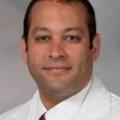
University of Mississippi Medical Center
Section Chief, General Thoracic Surgery

Laurie’s Path to Finding the Right Doctor, the Right Test, and the Right Treatment
Laurie Seligman, a 57-year-old bookkeeper living in Texas, had a lingering cough, but over-the-counter cough syrup seemed to help, so she didn’t think much of it and she continued with her usual activities.
One day in 2017, she hurt her back moving a heavy bed, and went to her general care doctor. She mentioned the cough and got an X-ray. After being treated for pneumonia, her symptoms subsided. She had a follow-up X-ray but was told that it was normal for the pneumonia to still be visible on the scans even after the symptoms were gone.

6 Months. $22K Raised. 65.5 Miles Ran. 1 Life-Changing Conference.
In March 2023, Marlys Carlson was diagnosed with stage IV non-small cell lung cancer. This news was a total shock and absolutely heartbreaking for her and her family. Steph, Marlys’ daughter, immediately started looking for ways she could help her mom.
“I’m pretty good with research as that is part of my job, so I spent time on the internet looking for anything and everything I could find as a resource. That’s when I came across LUNGevity,” said Steph.

Embracing Joy: Kat’s Shift in Perspective After Being Diagnosed With Lung Cancer
Katherine Adelufosi had always been a private person. Through her experiences, she now understands the value of openness and vulnerability. "There were times I have hesitated to share," she admitted. "But then, I remember how others' stories have empowered me. I felt compelled to do the same."
Kat's story underscores strength, resilience, and the incredible value of community support. Her narrative reminds us of life's unexpected turns, the importance of positivity, and embracing the present.

Summer Fun: Create Your Own Fundraisers for LUNGevity!
Thank you to everyone who embraced summer by transforming their favorite activities into impactful fundraisers! Here are some heartwarming and fun ways our supporters have recently championed the cause.

The Path to Progress: One Researcher’s Journey to a Blood Test for Lung Cancer
Currently, lung cancer screening using low-density computed tomography (LDCT) scans is available as a tool to screen for lung cancer in individuals at high risk of developing the disease.

LUNGevity Launches Early Lung Cancer Center
LUNGevity is excited to announce the launch of the LUNGevity Early Lung Cancer Center (ELCC). The ELCC was created to accelerate the development of early detection and early treatment options, so people diagnosed with lung cancer have the best chance for long-term survival and a better quality of life.
LUNGevity Launches Early Lung Cancer Center to Accelerate the Early Diagnosis and Treatment of Lung Cancer
Driving a multitude of lung cancer early detection initiatives allows more people to be diagnosed earlier when the disease is more treatable
ELCC LP block
Early Lung Cancer Center
LUNGevity's Early Lung Cancer Center takes a comprehensive approach to transforming the way lung cancer is diagnosed and treated, with a goal of shifting diagnosis to early stages when it is most treatable.
News & Media LP block
News & Media
The latest LUNGevity announcements plus news about advances in lung cancer science and research.
Working for You
Working for You
Our ongoing work to amplify the patient voice and improve outcomes for people with lung cancer.

Decentralized Trials: Bringing Clinical Trials Closer to the Patient
While participating in clinical trials can provide substantial benefits to people with lung cancer, the resources required to do so may pose significant hurdles, especially to those who don’t live close to where trials are held, such as academic medical centers or major oncology network sites. Decentralized clinical trials remove some hurdles to trial participation for patients and are thus important for improving trial access for larger and more diverse groups of people. The U.S.

Climbing Mountains for Lung Cancer: Jay Fundraises in Memory of His Sister Kim
Jay Mathers traveled to Nepal in October 2022 with his sights set on summiting Mt. Ama Dablam. This iconic Himalayan mountain is a stunning 22,349 ft. Due to dangerous conditions, Jay was just shy of the summit, having climbed 21,000 ft while fundraising for LUNGevity in memory of his sister. Jay used LUNGevity’s Create Your Own fundraising tools to raise more than $5,700, which added to the significance of his climb as LUNGevity was a cause near to his sister, Kim Mathers-Heffernan’s, heart.
Raymond Osarogiagbon, MD

Baptist Cancer Center
Director of the Multidisciplinary Thoracic Oncology Program
Vanderbilt University
Research Professor
Vanderbilt Ingram Cancer Center
Research Member
Samir Hanash, MD, PhD

The University of Texas MD Anderson Cancer Center
Director, Department of Red and Charline McCombs Institute
for the Early Detection and Treatment of Cancer
Co-Director, Department of Center for
Global Cancer Early Detection
Peter Mazzone, MD, MPH
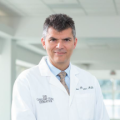
Case Western Reserve University
Clinical Assistant Professor,
Department of Medicine, School of Medicine
Member, Population and Cancer Prevention Program,
Case Comprehensive Cancer Center
Cleveland Clinic
Pulmonary Medicine

2023 ASCO: Highlights of Lung Cancer Research
Recently, members of LUNGevity Foundation joined thousands of attendees from the US and around the world, including oncologists, scientists, biotech and pharmaceutical representatives, advocates, and patients, to discuss life-saving cancer research at the annual meeting of the American Society of Clinical Oncology (ASCO) in Chicago from June 2 through June 6, 2023.

From Quiet to Community: Opening Up About Her Lung Cancer
Something was off, and Jessica thought she knew why.
At the beginning of 2022, she caught COVID and developed a cough. The cough lingered for months, and she figured it was a long-term side effect that would eventually go away. But eight months later, it was still there. The coughing was now followed by wheezing, and it seemed that something might really be wrong.

Policy Focus: Court Case Challenges Private Insurance Coverage for Screening Costs
A recent court case called Braidwood Management Inc. v. Becerra has received a lot of attention in the public health and cancer patient advocate communities.
Current law requires private insurance companies to provide no-cost coverage for lung cancer screening, which LUNGevity supports. This court case could negate that requirement. This case will not directly impact Medicaid or Medicare, which also covers the cost of lung cancer screening.

LUNGevity Research Digs Deep Into Remote Patient Monitoring in Rural Communities
Since 2016, the medical community has seen strong data showing that remote patient monitoring (RPM), which gives people living with cancer simple ways to report treatment side effects, has a significant impact on patients’ outcomes and survival rates.

LUNGevity Research Delves into Patient Experiences with Biomarker Testing
Since 2020, LUNGevity has been engaged in research to understand the experiences of lung cancer patients, particularly those receiving care at community hospitals and those from medically underserved communities, as they receive biomarker testing.

Tracing the Clues of a Global Killer: How Dr. Charles Swanton’s Research Is Shedding New Light on Lung Cancer
As Chief Investigator of the groundbreaking Cancer Research UK (CRUK) TRACERx study, you could say that Dr. Charles Swanton is having a moment. Launched nine years ago, TRACERx seeks to understand lung cancer at its most basic level, “tracing” the clues that may predict how it starts and eventually changes over time so that doctors can treat it better.
LUNGevity Foundation Welcomes Leah Fine, MBA, to the Organization
Leah will spearhead several of LUNGevity’s early lung cancer initiatives, bringing her expertise in oncology early detection, precision medicine, and multidisciplinary care to the role.

The Basics of Neuroendocrine Tumors (NETs)
Our lung tissue is made of different kinds of cells, including neuroendocrine cells. If these cells develop changes in their genome, they can begin to grow out of control and become tumors.

What the End of the COVID Public Health Emergency Means for You
It’s been more than 3 years since the US Department of Health and Human Services (HHS) first declared a nationwide Public Health Emergency (PHE) due to COVID-19. Since then, periodic renewals of the PHE have increased the flexibility of healthcare delivery. The PHE is set to end on May 11, 2023. A separate National Emergency that was enacted due to COVID-19 ended on April 10. Of the two, the end of the PHE will be more consequential for day-to-day healthcare delivery.

The Pervasive Stigma Associated With Lung Cancer
So how did I get lung cancer? Well, if you’re a lung cancer patient like me, I’m certain that this all too common question has played over and over in your mind as well; much like an endless repeat of a badly broken record (and yes, in light of today’s technology I am unabashedly dating myself here)! Walking back through the last six decades of my life, I reflected on the remarkable strength of my respiratory system and the fact that I never had a cough…except when I contracted the first variant of COVID in 2020.
Get Involved (S&A landing page) LP block
Events & Community
Join an event, volunteer, or fundraise to get involved with LUNGevity and the lung cancer community.

Highlights of the 2023 Small Cell Lung Cancer IASLC Hot Topics Meeting
The first week of April definitely started with a bang! After the 2019 in-person small cell lung cancer (SCLC) meeting—convened by the International Association for the Study of Lung Cancer (IASLC) and hosted by Memorial Sloan Kettering Cancer in New York—the pandemic hit us in 2020. The 2021 meeting was virtual, so it was absolutely amazing to be back in person at the 2023 Small Cell Lung Cancer IASLC Hot Topics Meeting, again at Memorial Sloan Kettering.

10 Reasons to Attend LUNGevity’s HOPE Summit
HOPE Summit is a weekend conference unlike any other! The Summit brings hundreds of people affected by lung cancer together to build their community, give and get support, and learn how to live well with lung cancer.
As returning participant, Tom, puts it, “Imagine a world where you can look around and see hundreds of people thriving with lung cancer. Imagination is not necessary! Join us at the LUNGevity Summit on May 5th and celebrate life!”

Tackling the Biggest Challenges in Cancer
Cancer Grand Challenges is a partnership between Cancer Research UK (CRUK) and the National Cancer Institute (NCI), which funds global teams of leading researchers across various scientific disciplines to tackle some of the toughest challenges in cancer research. As Dinah Singer, Acting Director of NCI’s Center for Strategic Scientific Initiatives says, “Cancer research is a global endeavor.”

How is Lung Cancer Caught Early?
The point at which lung cancer is diagnosed plays a key role in treatment and survival. The average 5-year survival rate for lung cancer diagnosed while still localized (stage I) is 61%. However, when it has spread to other organs of the body (such as the brain or liver) and is classified as distant, the 5-year survival rate drops to 7%.
So, how is lung cancer diagnosed early to increase survival?
LUNGevity Announces Pierre Massion Young Investigator Awards for Early Detection Research
Two rising stars in lung cancer early detection awarded research funds in honor of LUNGevity’s first Scientific Advisory Board member

Finding Clinical Trials for Lung Cancer: Tools and Resources

Real-World Drug Development at the Targeted Therapies of Lung Cancer Meeting

Emotional Care for the Whole Family

An Introduction to Squamous Cell Lung Cancer

Ask Your Oncologist the Right Questions
Communication is critical to a positive doctor-patient relationship. Knowing the right questions to ask helps ensure you leave your appointments with the information and answers you need. Being prepared may also lessen anxiety and help provide a sense of control. Meeting with your oncologist, especially when first diagnosed or deciding on a treatment plan, are times when being prepared with questions is necessary.
Michelle Futrell, RN


For Caregivers: How to Support Your Loved One at Appointments

Innovative Research Brings Potential New Class of Drugs for Patients with ALK-EML4 Fusion

World Cancer Day and #CloseTheCareGap in Lung Cancer Screenings
For World Cancer Day this year, the Union for International Cancer Control presents the #CloseTheCareGap initiative. February 4, 2023 will be a day focused on promoting equity in the cancer space. The goal is to create best-case outcomes for all people diagnosed with cancer, regardless of race, gender, location, finances, sexual orientation, age, disability, and lifestyle.
LC in the News 2023-01-30
In Partnership with Rising Tide Foundation, LUNGevity Issues RFA for $1.5M Lung Cancer Research Grant
Collaboration seeks to leverage studies of common drug-resistance mechanisms to improve outcomes for patients with oncogene-driven lung adenocarcinoma
EGFR Resisters Partners with LUNGevity to Issue RFA for Research into EGFR-Positive Lung Cancer
Collaboration seeks to improve outcomes for patients with EGFR-positive non-small cell lung cancer
LUNGevity Partners with ASTRO to Issue RFA for Lung Cancer Research Grant
Collaboration to seed critical progress in radiation oncology for patients with lung cancer
LUNGevity Issues Five RFAs Totaling $2.3M for Translational Research Awards in Lung Cancer
Applications are now available online

Researchers Make New Inroads for EGFR Exon20+ NSCLC Patients
LUNGevity Foundation Welcomes Michelle Futrell, RN, as Director of Lung Cancer Screening Programs and Initiatives
Michelle’s vast personal and professional experience will help accelerate efforts to increase lung cancer screening

How Nina’s Clinical Trial Led to a High-Five Celebration
Her doctor was excited, which made Nina excited. They high-fived and couldn’t believe the progress that had been made in just a few weeks. The clinical trial was already having positive effects.
Before her clinical trial success, Nina went through the standard treatments for people with small-cell lung cancer (SCLC). She was diagnosed in early 2014, and the plan was to try different chemo and radiation therapies.

Exercise and Lung Cancer: Low-Impact Workouts
Overall health becomes a major priority when undergoing lung cancer treatment, and staying active is one way to include healthy behaviors in your life. Talking with your doctor about exercise and lung cancer is important to remain safe and do activities your body and lungs can handle. If you feel chest or lung pain during any workouts, stop immediately and tell your doctor.
Gilteritinib for lorlatinib-resistant ALK NSCLC
Lorlatinib is currently the only approved treatment for patients with ALK-positive NSCLC whose cancers have progressed on prior ALK drugs, and for those whose tumors develop resistance, there is a lack of other treatment options other than chemotherapy. In this study, Dr. Qin will evaluate a novel drug called gilteritinib as a treatment in patients with ALK-positive NSCLC whose tumors have developed a resistance to lorlatinib.
Research Summary
Lorlatinib is the only approved ALK-targeted drug for patients with ALK-positive non-small cell lung cancer (ALK NSCLC) who progressed on prior ALK drugs. The average duration of benefit from lorlatinib is seven months before resistance develops. There are currently no approved ALK-directed therapies after lorlatinib.
Our understanding of lorlatinib resistance mechanisms remains limited. However, we know that 1) cancer cells can develop two ALK mutations that block lorlatinib action and 2) cancer cells can activate other pathways so that cancers no longer exclusively rely on ALK.
This proposal addresses ALK resistance directly, with the goal of opening a clinical trial using a novel drug called gilteritinib. Preliminary tests show gilteritinib prevents ALK NSCLC from using alternative pathways to overcome ALK inhibition. First, we propose to obtain tumor-containing samples from patients who are progressing on lorlatinib and perform in-depth sequencing of these cancer cells to thoroughly describe resistance mechanisms in all detectable cancer clones. Next, we will perform drug sensitivity testing on these cancer cells using approved and experimental drugs, including gilteritinib. Finally, we will open a clinical trial using gilteritinib, already approved for treatment of a blood cancer (FLT3+ acute myeloid leukemia). In multiple pre-clinical studies, gilteritinib was able to kill lorlatinib-resistant cells, but this drug has not been given to patients with ALK NSCLC. Our proposal focuses on bringing knowledge obtained from patients’ cancer cells through extensive analysis directly into a clinical trial with a novel drug, maximizing the impact to patients.
Technical Abstract
Lorlatinib is currently the only approved ALK TKI (tyrosine kinase inhibitor) for patients with ALK NSCLC that have progressed on prior lines of therapy. The clinical benefit of lorlatinib is modest in previously-treated patients with a median PFS of 7 months (1). Mechanisms of lorlatinib resistance are diverse and include novel ALK mutations, compound ALK mutations, and activation of bypass pathways including AXL. Gilteritinib is a dual inhibitor of FLT3/AXL that is approved for relapsed/refractory FLT3+ acute myeloid leukemia (AML). Pre-clinical work using ALK fusion positive cell lines (including those containing compound mutations), patient-derived tumor cells, and in vivo mouse studies all demonstrate the anti-tumor activity of gilteritinib specifically against lorlatinib-resistant ALK NSCLC.
We will recruit patients with ALK NSCLC with progression on lorlatinib and collect patient-derived tumor samples. In addition to surgical, biopsy, or effusion fluid samples, plasma will be collected for isolation of circulating tumor DNA and circulating tumor cells. Whole exome sequencing (WES) will be used to identify molecular alterations that define resistance mechanisms. Ex vivo drug testing will be conducted using our existing platform and will include ALK inhibitors and inhibitors of pathways implicated in resistance such as AXL, MET, mTOR, and MAPK. Results of ex vivo drug testing will be correlated with findings from WES.
Simultaneously, we will open a phase I clinical trial to assess the safety and preliminary efficacy of gilteritinib in patients with lorlatinib-resistant ALK NSCLC. Crucially, clinical endpoints will be correlated with sequencing data and ex vivo drug testing results.
Development of ALK-specific TCR-T cells for the eradication of ALK+ NSCLC
In this project, Dr. Chiarle and his team will generate T cells that have engineered receptors, called TCR receptors (TCR-T cells), that will selectively target and attack the ALK protein that is expressed by tumor cells. Generation of such cells could be a powerful tool to eradicate ALK+ lung cancer cells and form the basis of a TCR-T cell-based clinical trial for patients with TKI-resistant ALK+ NSCLC.
Research Summary
Patients with an ALK-positive lung cancer are typically young. For these patients several oral ALK inhibitors are available as pills, typically alectinib, lorlatinib, and brigatinib. These ALK inhibitors are very effective and well tolerated and most patients respond for long time. However, tumors may progressively develop resistance and start to grow back. In this setting of relapsing disease, few therapeutic options are left because most patients with ALK-positive lung cancer do not respond to existing immunotherapies.
For several years, we have been working to develop immunotherapy tools specifically for patients with ALK-positive lung cancer. In this proposal, the strategy is to re-engineer patients’ naturally occurring immune cells to target ALK selectively expressed by tumor cells. First, we will discover several receptors (TCRs) that T lymphocytes use to recognize ALK and kill tumor cells. Next, we will re-introduce these TCRs into the T lymphocytes to rapidly generate a large pool of killer cells all directed simultaneous against the tumor. The rapid infusion of a large number of TCR-engineered T lymphocytes, called TCR-T cells, will generate a wave of killing toward which the tumor will not have the time to adapt and escape. While the identification of ALK specific TCR might be difficult and elusive, we already discovered a series of very specific TCRs directed against ALK expressed by ALK-positive tumors in mice. Leveraging the discovery of ALK peptides expressed by human tumor cells, we will now discover specific TCRs that recognize ALK in human lung cancer. We will use these TCR-T cells to cure ALK-positive human tumors in combination with ALK inhibitors. We expect that this combination will be extremely powerful to rapidly eradicate tumor cells in the lung as well as in metastatic sites.
Technical Summary
About 5-7% of non-small cell lung cancers (NSCLCs) have a rearrangement of the anaplastic lymphoma kinase (ALK) gene. ALK-rearranged NSCLC is typically treated with ALK tyrosine kinase inhibitors (TKIs), but no effective immunotherapies are available for refractory or relapsed tumors. In previous work, we have shown that ALK is an immunogenic oncoprotein that induces specific T cell responses with potent killing activity against ALK+ tumor cells in the lung and in distant metastatic sites, such as the brain. Thus, the lack of efficacy of standard immunotherapy in ALK+ NSCLC can be bypassed by the development of tools to induce ALK-specific T cell responses. Our central hypothesis is that the generation of T cells engineered to express TCRs (TCR-T cells) that selectively target ALK+ NSCLC will be a powerful tool to completely eradicate ALK+ lung cancer cells.
In preliminary experiments, we have shown the feasibility of the cloning of ALK-specific TCRs against an ALK peptide expressed by a mouse model of ALK+ lung cancer. In Aim 1, we will test the potency, the safety and the in vivo efficacy of ALK-specific TCR-T cells obtained by T cells engineered to express TCRs against ALK in a mouse model of ALK+ lung cancer. TCR-T cells will be tested alone or in combination with ALK TKI. Their efficacy will be compared to natural anti-ALK T cells induced by vaccination in mice. In Aim 2, we will discover and study the activity of ALK-specific TCRs against human ALK peptides. We will leverage ALK peptides we previously identified to be expressed by human ALK+ NSCLC. The killing activity of these human specific TCR-T cells will be tested against human ALK+ NSCLC in vitro and in vivo, alone or in combination with ALK TKIs. We expect to identify potent and specific TCRs as leading candidates for a TCR-T cell-based clinical trial for patients with TKI-resistant ALK+ NSCLC.
Defining and novel therapeutic targeting of ALK fusion protein granules
Currently available ALK inhibitors are an effective treatment for lung cancer, but tumors can development treatment resistance. In this project, Dr. Bivona will explore a novel way to treat ALK-positive lung cancer by targeting “membraneless cytoplasmic protein granules,” a new mechanism of signaling in ALK-positive lung cancer. His team will use precision medicine approaches that are complementary to current ALK inhibitors and that could improve their efficacy as well as quality of life for patients.
Research Summary
Technical Abstract

Tips For Managing Lung Cancer During the Holiday Season
The holidays are a time to celebrate, but they can also be a time of stress as we try to create that perfect celebration. Bringing together family and friends, decorating, shopping, cooking, hosting—the list goes on!
After a lung cancer diagnosis, it’s easy to feel like you can’t keep up and that your holidays will never be the same. They can be special; just remember to take care of yourself first before taking care of the holidays.

Improving Lung Cancer Outcomes for US Veterans
Lung cancer risk for our military veterans is significant. This is because many smoked or had significant exposure during their service to toxic environmental hazards such as burn pits. The US Department of Veteran Affairs (VA) estimates that each year, the Veterans Health Administration diagnoses and treats approximately 8,000 veterans with lung cancer. Because VA also estimates that nearly 1.5 million veterans are at risk for developing lung cancer due to age and smoking status alone, VA supports broad lung cancer screening implementation programs to improve early detection.

LUNGevity Award Sparks New Biomarker Research for Patients with NSCLC
When Sean Pitroda, MD, reached out to the Grants Office at the University of Chicago, he was looking for additional funding to continue his research into treating colorectal cancer with immunotherapy. Working with institutional grants from the university had yielded exciting findings, but he needed additional funding to continue his research.
ALK Positive and LUNGevity Foundation Announce Recipients of the 2022 ALK-Positive Research Awards
To transform advanced ALK-positive lung cancer into a chronic or curable disease, ALK Positive to award $1.75 million through their research award program
LC in the News 2022-11-29

The Viral Triple Threat: COVID-19, Flu and RSV
It is hard to believe that we’re already in November and celebrating Lung Cancer Awareness Month! In addition to recognizing LCAM, fall is also a good time to remind people, especially those with compromised lungs, to take action to protect their lung health.

Healthy Eating for the Holidays
With the holiday season in full swing, it’s the perfect time to explore seasonal ingredients and highlight healthy holiday nutrition tips. Fall brings some of the most flavorful, colorful seasonal produce that you can incorporate into holiday dishes (or any dishes!). Seasonal foods are harvested at optimal ripeness, resulting in tastier, fresher, and typically less expensive produce. We have highlighted some seasonal fruits and vegetables that can make the biggest impact on your health.
LC in the News 2022-11-12

Veterans Day 2022 - The PACT Act Expands Veterans Health Care Benefits
LUNGevity Foundation proudly supports U.S. Veterans and recognizes the many in our community who have selflessly served. United States military members are at an increased risk for injuries and illnesses, including several types of cancer, presumably due to environmental exposures while serving. This Veterans Day comes after a major win for Veterans health services and support, specifically for those at risk for developing conditions like lung cancer.
LUNGevity Foundation Launches “Find Your Lung Cancer Community” Public Service and Social Media Campaign During Lung Cancer Awareness Month
People living with lung cancer and their caregivers share the importance of finding your community to live better with lung cancer
LUNGevity Foundation’s No One Missed Campaign Celebrates Second Year of #KnowYourBiomarker Storytelling Initiative to Drive Awareness of Comprehensive Biomarker Testing in Lung Cancer
Awareness campaign underscores importance of biomarker testing as part of “KNOWvember” during Lung Cancer Awareness Month
LUNGevity Foundation Launches Minority Mentorship and Training Program to Help Increase Diversity in Lung Cancer Workforce
Providing mentorship for minority researchers and clinicians is vital to create an inclusive work environment and improving outcomes for minority patients

Being a Caregiver for a Parent
Tumor draining lymph node immunomodulation to decrease recurrence in NSCLC
Lymph nodes are small structures that work as filters for foreign substances, such as cancer cells and infections. These nodes contain infection-fighting immune cells that are carried in through the lymph fluid. This project will study the lymph node draining basin, which is involved in the spread of a tumor from the original location site to distant sites, and whether activating cancer-fighting T-cells can decrease recurrence in NSCLC. Dr. Villena-Vargas will use animal models to investigate whether immune checkpoint inhibitors enhance lymph node T-cells memory, which increases their ability to recognize cancer cells in the bod and can prevent metastatic recurrence.
Lung cancer Equity Through Social needs Screening (LETS SCREEN)
Dr. Velasquez Manana will conduct an observational study in a multiethnic group of patients with unresectable lung cancer to determine the association between social needs, care utilization, and quality of life. The goal of this study is to fill a key knowledge gap in the care of patients with NSCLC and inform interventions to support patients at risk of social adversity during treatment to end disparities in lung cancer care.
Promoting lung cancer screening in Latinx patients with previous HNSCC
In addition to tobacco use, having a previous malignancy is a risk factor for developing lung cancer. Head and neck cancer (HNC) survivors with a history of smoking have up to a 13% risk of developing lung cancer. Dr. Olazagasti’s study will assess the awareness and eligibility of lung cancer screening in Hispanic/LatinX HNC survivors via a survey questionnaire and understand the barriers to screening via qualitative interviews. The goal of her research is to create the first lung cancer screening program tailored for and focused exclusively on Hispanic/LatinX HNC survivors.
Young lung cancer: psychosocial needs assessment
Dr. Florez will study the psychosocial and financial impact of lung cancer in young patients (< 50 years of age). This patient population has seen an increase in incidence in recent years, but little is known about their specific needs. The study will include administration of a survey and focus groups to understand unmet needs of this group of patients. The information gathered from this study will be used to identify challenges unique to this population and develop the first clinical and research program of its kind for young lung cancer patients.
Synergistic expression of combined RT and dual-immune checkpoint blockade
Recent studies have shown that high and low dose radiation used in combination with immunotherapy have a synergistic effect in modulating the growth of satellite tumors, which are tumor cells located near the primary tumor. In this study, Dr. Shulman proposes using an animal model of metastatic lung cancer to test the hypothesis that radiation given in repeated very low dose pulses in combination with immunotherapy can further enhance immunotherapeutic benefit in metastatic lung cancer.
Isotoxic hypofractionation to personalize radiation for NSCLC
The purpose of this study is to develop and evaluate a method for personalized radiation therapy in patients with locally advanced NSCLC. Patients will be assessed regarding their expected risk of treatment toxicity, and those at lower risk will be treated in a fewer number of treatments with a more intensified dose of radiation. If successful, this could be used to inform optimal radiation treatment protocols as well as potentially reduce treatment and financial burden for patients, with a major impact on quality of life.
Predicting clinical benefit of immunotherapy in veterans
This study will use data from the Veterans Affairs system to develop statistical models to predict response to immunotherapy in patients with lung cancer. While immunotherapy has improved outcomes for many patients, it is still not well understood why some respond well and others do not. If successful, this work will produce a comprehensive prediction model of immunotherapy benefit in lung cancer that could be used to counsel patients, inform patient-physician decision making, and identify patients who need more- or less-aggressive treatment.
Combination checkpoint blockade plus VEGF inhibitor in EGFR-mutated NSCLC
Osimertinib is the standard of care for treating non-small cell lung cancer with EGFR mutations. Unfortunately, the tumors inevitably develop resistance to osimertinib. Currently, very few treatment options exist for patients whose cancers have become resistant to osimertinib. Dr. Reuss is conducting a phase 2 clinical trial to test whether two immunotherapy drugs, atezolizumab and tiragolumab, given with a VEGF inhibitor, bevacizumab, are effective in controlling EGFR-positive NSCLC that has become resistant to osimertinib.
Therapeutic targeting of BRAF fusion altered lung cancer
Alterations in the BRAF gene can lead to the development of non-small cell lung cancer. BRAF fusions are a type of BRAF gene alterations. These fusions are powerful growth stimulators of lung cancer. Currently, no treatment exists for cancers that harbor these BRAF fusions. Dr. Offin will be testing a series of new drugs in preclinical cell line and animal models of lung cancer. The ultimate goal of his project is to identify new drugs that can be tested in clinical trials.
Phase 2 trial of neoadjuvant KRAS G12C directed therapy in resectable NSCLC
Around one in three patients with non-small cell lung cancer are diagnosed with early-stage disease, where surgery is offered as curative therapy. Unfortunately, the cancer can recur in 50%-60% of patients. The rate of recurrence is higher in patients whose tumors have certain mutations, such as mutations in the KRAS gene. Dr. Marrone and her team will be conducting a phase 2 trial to test whether treatment with a KRAS G12C blocking drug, adagrasib, given as a single drug or in combination with an immunotherapy drug, nivolumab, before a patient undergoes surgery can delay or prevent recurrence in patients whose tumors have a KRAS G12C mutation.

Breathe Deep Chicago: Team Captains Lead the Way for Lung Cancer Awareness
LUNGevity is excited to kick off Lung Cancer Awareness month this November with Breathe Deep TOGETHER presented by Amgen.
LUNGevity Foundation Welcomes Ann Fish-Steagall, BSN, RN, as Senior Vice President of Patient Services
With 40 years of expertise as an oncology nurse navigator and leader in clinical operations, Ann provides insight and value to LUNGevity’s Support and Survivorship programs

Navigating the Stigma of Lung Cancer: A Psychologist's Perspective
Dr. Jamie Ostroff, clinical health psychologist and psychological liaison to the Thoracic Disease Management Team at Memorial Sloan-Kettering Cancer Center, weighed in with her perspective on smoking stigma and its effect on the lung cancer community. Dr. Ostroff founded Memorial Sloan-Kettering’s Tobacco Treatment Program, where she continues to serve as director and works with people diagnosed with cancer seeking treatment for tobacco dependency.
LUNGevity Foundation Grants Two Research Awards for Lung Cancer Studies Within the VA System
LUNGevity strategically supports lung cancer researchers to continue progress in early detection and treatment

Survivor Spotlight: Randi Young and Sharon Schneider Found Their Footing with Team LUNGevity
Team LUNGevity attracts experienced athletes, newcomers, and everyone in between.
LUNGevity Grants Three Career Development Awards to Accelerate Lung Cancer Research
For the 11th consecutive year, LUNGevity invests in the future of lung cancer research
Clinical Trials LP block (patient research)
Participate in a Clinical Trial
Treatment and drug-specific studies for different types of lung cancer.
LUNGevity Studies LP block
Participate in LUNGevity Research
Focused on the lived experience of patients on topics like medication side effects, quality of life, treatment changes, and more.

Get to know LUNGevity’s Lung Cancer Support Services
Whether you are newly diagnosed or a long-term survivor, LUNGevity offers lung cancer support and survivorship services to address your unique needs. LUNGevity's services are designed to help you feel supported, informed, and empowered to be an active decision-maker in your treatment process and live well with the disease.
LUNGevity Foundation Issues Five Health Equity and Inclusiveness Research Awards
Improving diverse representation in the scientific community promotes equity in research and healthcare delivery

Improving Access to Telehealth Services for the Lung Cancer Community
Many patients began utilizing telehealth services as part of their care during the COVID-19 pandemic. While it is now clear that telehealth is here to stay, policymakers will need to take action to ensure that the services valued by patients are available and covered by insurance. In this blog, we answer some frequently asked questions and talk about what’s on the horizon for telehealth policy.

Team LUNGevity: Maggie and Jack Rogers Run in Memory of Their Father
In fall of 2012, the TCS New York City Marathon was canceled for the first time in the race’s history because of Superstorm Sandy. Jack Rogers had spent months preparing for the race, all while receiving treatment for non-small cell lung cancer, but sadly passed away only a few weeks after the original race date. Now, 10 years later, his children, Maggie and Jack Jr. are finishing the race for him.
Dr. David Gerber, University of Texas Southwestern, and LUNGevity Foundation Publish Recommendations to Simplify and Harmonize Lung Cancer Clinical Trials
Paper offers framework for standardizing eligibility criteria for lung cancer clinical trials

From the Experts: 3 Takeaways From the National Medical Association Convention
My first time attending the NMA 2022 Annual Convention and Scientific Assembly

Caregiver Resources Starter Kit: 5 Resources Caregivers Should Access upon their Loved One’s Diagnosis
Navigating a lung cancer diagnosis can feel overwhelming not only to the patient but to their caregiver as well. It’s normal to feel lost or confused and not know where to start or what resources to ask for. Because a cancer diagnosis is a family diagnosis, LUNGevity wants caregivers to know they don’t have to go through it alone. There are resources available to help caregivers take care of their loved ones as well as themselves. Here are 5 important caregiver resources to help with your loved one’s lung cancer diagnosis.
LUNGevity Launches New Small Cell Lung Cancer Patient Gateway
The specialized resource offers patients with small cell lung cancer (SCLC) and their caregivers access to treatment information, informative webinars, the latest scientific news, and a supportive community

Estate Planning 101: Protecting all you love this Make-A-Will Month
As LUNGevity seeks to empower patients to be active decision-makers in their treatment
process through our extensive educational resources, online peer-to-peer support, and
in-person survivorship programs, we also want our entire community to be able to make other
critical choices that impact your future. August is National Make-A-Will Month, and it’s the
perfect moment to protect all you love.
LUNGevity to Present Three Research Abstracts at 2022 World Lung Conference
Studies amplify voices of patients and caregivers within the lung cancer community

Fundraiser Spotlight: The Jones Family and Living Wide
Sherry Jones and her family are carrying on the torch for Living Wide, an inspirational movement started by Gregory Jones after his lung cancer diagnosis in 2016. According to Living Wide’s website, Gregory dedicated himself to maximizing the width of his life because he had no control over the length. To mentor, educate, and advocate for others, he founded Living Wide, an organization dedicated to helping all people live with joy, hope, meaning, and purpose despite profound uncertainty.

Improving Treatment for KRAS-mutated Lung Cancer
While targeted therapies have emerged in the past decade to improve treatment of non-small cell lung cancer (NSCLC) with some types of driver mutations (such as EGFR and ALK), lung adenocarcinomas with KRAS driver mutations have been notoriously difficult to study and treat.

The 2021 Global Lung Cancer Therapy Landscape
On June 1st, 2022, LUNGevity Foundation hosted a Facebook Live to discuss our manuscript titled “The 2021 Global Lung Cancer Therapy Landscape” published in the Journal of Thoracic Oncology.

A Survivor’s Experience with Biomarker Testing and TKI Treatments
Back in 2013, when Dan Cadigan was first diagnosed with stage III lung cancer, his treatment options were limited to surgery followed by chemotherapy. However, at his one-year follow-up scan, they found nodules in both lungs and he was diagnosed with stage IV recurrent cancer.
Normally, it would have meant a return to chemo for treatment.
LUNGevity Launches New Rare Mutations and Fusions Patient Gateway
The specialized resource offers patients with rare mutations or fusions in non-small cell lung cancer (NSCLC) and their caregivers access to treatment information, informative webinars, the latest scientific news, and a supportive community
New Study Highlights Progress in Drug Development Landscape for Lung Cancer
An analysis conducted by LUNGevity Foundation finds more therapies are being developed for early-stage lung cancer, highlighting the need for increased biomarker testing

Dr. Charles Rudin discusses key highlights from ASCO 2022
The American Society of Clinical Oncology (ASCO) Annual Meeting was held in Chicago June 3-7, 2022. Dr. Upal Basu Roy, Executive Director of Research at LUNGevity Foundation, sat down with Dr. Charles Rudin to discuss key highlights from ASCO 2022 and what they mean for the lung cancer community.
LUNGevity Foundation is proud to be part of the winning Cancer Grand Challenges global team addressing cancer cachexia
The team, composed of investigators from across the UK and US, will receive $25M to take on the challenge of cancer cachexia, the debilitating wasting condition responsible for up to 30% of cancer-related deaths.

Palliative Care 101 - Improving Quality of Life While in Treatment
Palliative care, or supportive care, often misunderstood as only end-of-life care, improves patients' quality of life while undergoing treatment. The goal of palliative care is to alleviate the symptoms and side effects caused by lung cancer or its treatment. It also can help you and your family deal with both the emotional aspects of your illness and any practical issues.

Conversations That Count: The Black Experience of Lung Cancer
On April 21, LUNGevity’s Director of Community Outreach, Dr. Eugene Manley, Jr., moderated the first in a series of Conversations That Count, titled The Black Experience of Lung Cancer. As part of LUNGevity Foundation’s health equity webinar series, the following panelists came together via Facebook Live to share personal and professional stories of incredible tenacity in accessing lung cancer care:
Amgen Receives LUNGevity Foundation Hope Award for Corporate Leadership
LUNGevity recognizes Amgen for its exceptional commitment to lung cancer communities and improving outcomes for people diagnosed with the disease
LUNGevity Launches New EGFR Patient Gateway
The specialized resource offers patients with EGFR-positive lung cancer and their caregivers access to informative webinars, the latest scientific news, and a supportive community

Cancer Disclosure in the Workplace
It can be difficult to decide what information to disclose at your workplace when navigating a cancer diagnosis. You may question whether or not to share your diagnosis with coworkers, what information you’ll be required to tell your employer, and how to receive workplace benefits such as time off or reasonable accommodations for your condition. LUNGevity has partnered with Triage Cancer to help people with lung cancer navigate these questions and the practical and legal issues that may arise after receiving a cancer diagnosis.
LUNGevity Names Maisha Standifer, PhD, MPH, LUNGevity Community Scholar-in-Residence
In a consultative role, Dr. Standifer will aid in the development and cultivation of new research partners

Understanding Lung Cancer Staging
For people with lung cancer, one of the first steps in navigating their diagnosis comes from understanding what their lung cancer stage means for the future of their treatment.
Brandon Leonard, MA, Joins LUNGevity as Director of Government Affairs
A health policy professional with an extensive background in government affairs, Brandon will be an exceptional advocate for people living with lung cancer
Brendon Stiles, MD, Joins LUNGevity Scientific Advisory Board
A highly recognized cardiothoracic surgeon, Dr. Stiles is committed to eliminating health disparities
Brendon Stiles, MD

Montefiore Health System, Bronx, NY
Chief of Thoracic Surgery and Surgical Oncology
Albert Einstein Cancer Center
Associate Director of Surgical Oncology
Angela James, MBA, LMSW, MEd, Joins LUNGevity as Care Navigator
A licensed social worker with extensive oncology experience, James will be a valuable resource for people living with lung cancer

For Caregivers: Maintaining Your Emotional Health While Caring for Others
Caregiving may be the most challenging role a person can take on, but also one of the most valuable. In some instances, providing physical and emotional care to a loved one can become a round-the-clock job that may shift other priorities like career or relationships.

Expanded Coverage of Lung Cancer Screening with Low-Density Computed Tomography
On February 10, 2022, the Centers for Medicare & Medicaid Services (CMS) issued a National Coverage Decision to expand reimbursement for lung cancer screening with low-density computed tomography (LDCT).
LUNGevity Launches New ALK Patient Gateway
The specialized resource offers patients with ALK-positive lung cancer and their caregivers access to information, scientific news, webinars, and community

A Work in Progress: Developing Personalized Medicine for SCLC
Personalized medicine, in which the molecular profile of each patient’s tumor helps customize the course of treatment, has been useful in treating many types of cancer, including non-small cell lung cancer (NSCLC). However, for patients diagnosed with extensive small cell lung cancer (SCLC), the treatment plans are mostly one size fits all.
LUNGevity Welcomes Eugene Manley, Jr, PhD, as Director of Community Engagement
Dr. Manley, Jr, brings years of experience focused on equitable access to health care
eRACE - LP
eRACE Lung Cancer
Participate in this month-long activity challenge that brings together runners, swimmers, cyclists, and others from across the country.

Progress in Targeting MET Drivers in Advanced NSCLC
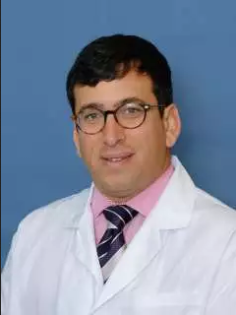
MET is a gene that encodes for a MET protein. It is an important signaling protein known to play many different important roles, from the development of embryos to wound healing in adults.

Fundraiser Spotlight: Riki and Meital Wiederhorn
Riki Wiederhorn and her daughter Meital of Westport, Connecticut have taken on a new challenge, participating in their first half-marathon in memory of their belated friend, lung cancer patient and advocate, Nancy Cohen. The duo is running in the Tel Aviv half-marathon later this month and have been fundraising as part of the B.Y.O.B. (Bring Your Own Bib) program with Team LUNGevity.
Targeting lineage plasticity to suppress DTP in RET-positive lung cancer
Despite an initial response to the newly approved RET inhibiting drugs, most RET-positive lung cancers become resistant to these drugs and the cancers relapse. Dr. Watanabe’s project will provide anti-relapse therapeutic strategies for RET-positive lung cancer that target newly identified “drug-tolerant persisters (DTPs)”. DTPs are a small population of cancer cells that do not respond to these drugs and therefore start growing, leading to the relapse of these cancers. The role of DTPs in RET-positive lung cancer is not well understood. Dr. Watanabe proposes therapeutic strategies, such as targeting the Wnt and Hippo signaling pathway to overcome the DTP adaptability and prevent relapse before these cells arise.
T cell receptor engineering for the treatment of RET fusion-positive NSCLC
Despite advances in the development of RET inhibitors, patients with RET fusions eventually progress. Immunotherapy has been inefficient in patients harboring RET fusions. However, RET fusion proteins themselves may be immunogenic and give rise to an immune response. Dr. Reuben hypothesizes that RET fusions give rise to immunogenic antigens which can be effectively recognized and targeted by engineered T-cells. This project will identify which antigens can elicit an immune response. This information will be used to engineer customized T-cells to gain the ability to recognize those cancer cells that produce these RET fusion proteins. The ultimate goal is to offer new therapeutic alternatives by expanding the possibility of immunotherapy treatment in the overwhelming majority of NSCLC patients harboring RET fusions.
MET and EGFR as biomarkers for amivantamab in overcoming RET TKI resistance
Two possible pathways that seem to be important for resistance to RET inhibitors are the EGFR and MET signaling pathways. Conventional methods of detecting EGFR or MET resistance may not identify many cases where both pathways are involved. In this study, Dr. Patil will use several different laboratory techniques to better detect and define EGFR and MET resistance. He anticipates that the EGFR and MET pathways can be blocked by a newer drug called amivantamab, which is a bi-specific antibody that specifically targets both EGFR and MET.
Novel structure-based and combinatorial approaches for RET-fusion NSCLC
There is an urgent need to identify new agents or combination therapies to benefit patients whose tumors have developed resistance to current RET inhibitors. Currently, the true extent of RET-dependent (resistance mutations in the RET gene) versus RET-independent mechanisms of resistance is unknown. Dr. Heymach’s team will study mechanisms and biomarkers of RET-independent drug resistance and test different drug combinations to overcome RET inhibitor resistance.
Identifying non-genomic mechanisms of RET TKI resistance
Many RET-positive cancers become resistant to targeted therapy for reasons not clearly based on genetic changes alone. Dr. Drilon predicts that other causes of resistance include (1) chemical changes (in the “epigenome”) that turn cancer-causing genes on or off and (2) changes in how these cancers look under the microscope (“histology”) that affect cancer behavior. Because these changes affect cell states rather than mutations, this resistance is potentially reversible, defining a key opportunity to maintain, restore, and extend sensitivity to potent and specific RET inhibitors.
The Hamoui Foundation and LUNGevity Foundation Present Awards for RET-Positive Lung Cancer Research to Drs. Alexander Drilon, John Heymach, and Tejas Patil
Funding to improve outcomes for those with advanced RET-positive lung cancer
RETpositive and LUNGevity Foundation Partner on Innovative Lung Cancer Research Award
RET-positive lung cancer community funds research into critical areas of need
LUNGevity Foundation Issues Request for Applications for 2022 Pierre Massion Young Investigator Award for Early Detection Research
New award program honors the late Dr. Massion, internationally renowned expert in lung cancer early detection and prevention strategies; applications are now available online
LUNGevity Foundation Issues 2022 Requests for Applications for Two Lung Cancer Research Award Programs Supporting Minority Investigators
Applications are now available online
LUNGevity Foundation Issues Request for Applications for 2022 Career Development Awards in Lung Cancer Translational Research
Applications are now available online
LUNGevity Foundation Issues 2022 Request for Applications for Lung Cancer Translational Research Award Supporting Veterans Affairs Researchers
Applications are now available online
LUNGevity Partners with ALK Positive to Award $1.5 Million in Lung Cancer Research Grants
Collaboration for patient-driven research that has lifesaving potential

Five Things Homeowners Need to Know About Radon
January is National Radon Awareness Month

New Options in Adjuvant Therapy for Early-Stage NSCLC
Historically, surgery has been the most effective treatment for patients with early-stage non-small cell lung cancer (NSCLC). While technological improvements, such as the development of minimally invasive techniques (such as video-assisted thoracoscopic surgery or VATS), have made surgeries safer for patients, the ability to cure early-stage NSCLC patients hasn’t improved significantly in recent decades. Even after successful surgeries that completely remove the visible tumor, about half of these patients will face a recurrence with their cancer coming back within five years.

Resources for Lung Cancer Caregivers
Being a caregiver for someone with lung cancer can be rewarding, but it can also be challenging. This is because a lung cancer diagnosis is life-changing for both the person with the disease and their caregiver.
LUNGevity Foundation Awards Inaugural Health Equity for Communities Research Awards
Investigators to create programs to address barriers to equitable lung cancer healthcare in high-risk populations
Tailoring Screening and Smoking Cessation for the LGBTQ community
The lesbian, gay, bisexual, trans, and queer (LGBTQ) community faces several health disparities, including a higher rate of lung cancer due to increased rates of tobacco use in this group. Dr. Triplette will partner with an urban LGBTQ community center to create and evaluate a tailored lung cancer screening and smoking cessation navigation program to specifically address the needs of this community. By directly partnering with stakeholders and community members, he plans to develop a sustainable program that will assist LGBTQ community members with both screening and cessation that can then be disseminated to improve the health of LGBTQ patients across the country.
CBPR intervention to decrease lung cancer stigma and health disparities
The use of mindfulness has the potential to address the multiple intersections of stigma in high-risk lung cancer groups inclusive of racial/ethnic and LGBTQ+ communities. A known approach of mindfulness (MOST) that has proven utility in other cancer-related fields has not been examined to a great extent in reducing stigma from lung cancer.
Dr. Riley is testing an innovative community-based participatory research (CBPR) and Multiphase Optimization Strategy (MOST) method to develop a brief virtual mindfulness intervention to decrease intersectional stigma. Dr. Riley will examine the reach, acceptability, and feasibility to underserved intersectional groups, including Black, Latinx, and LGBTQ+ lung cancer patients. This research project has a high likelihood of improving health behaviors and health outcomes for several communities.
LUNGevity Foundation Launches "Inhale for Life: Find it Early and Live" Public Service and Social Media Campaign During Lung Cancer Awareness Month
Medical experts and people living with lung cancer share the importance of early detection of lung cancer to ensure optimal patient outcomes
LUNGevity Foundation’s No One Missed Campaign Launches Year-Long #KnowYourBiomarker Storytelling Initiative to Drive Awareness of Comprehensive Biomarker Testing in Lung Cancer
Campaign recognizes November as “KNOWvember” during Lung Cancer Awareness Month
LUNGevity Foundation Launches New Lung Cancer Patient Gateways
The first of six innovative, specialized patient resources, the KRAS gateway allows patients to easily access KRAS-specific information and connect to community
Patient Gateways LP block
Patient Gateways
Get resources and information tailored for people with your specific type of lung cancer

Pulmonary Rehab for Lung Cancer
Some people with lung cancer have reduced lung function from their cancer or their treatments, like surgery, radiation, or chemotherapy. People with diminished lung functional capacity or shortness of breath may find pulmonary rehabilitation, a medical program that helps manage breathing, to be a helpful part of their palliative care.
Dr. Patricia Fogelman, DNP, a palliative care provider, talked to us to help us learn more about pulmonary rehab and its benefits.

Managing Your Mental Health with Cancer
Good mental health, or our emotional, psychological, and social well-being, is essential for overall health. Being diagnosed and living with cancer, however, can impact our mental health. It can affect how we think, feel, and act, so it’s important to recognize this change and find strategies to cope.
CancerCare Donates Lung Cancer URL to LUNGevity Foundation to Connect More People Affected by Lung Cancer with the Resources They Need
Donation of lungcancer.org expands impactful long-term partnership
Spotlight Nomination - LP block
LUNGevity Spotlight
Nominate someone living with lung cancer or a caregiver, volunteer, or fundraiser who is making a positive impact in the LUNGevity community.
Savor Health Nutrition Blog Questions - LP block
Ask Nutrition Questions
Your questions may be answered in an upcoming Savor Health blog post!
Disparities in NSCLC molecular testing
Investigating incidental pulmonary nodules in underserved communities
Improving lung cancer screening adherence among underserved populations
Ensuring precision-medicine delivery for veterans with lung cancer
Measuring provider engagement in lung cancer screening
Addressing hepatic siphoning to enhance immunotherapy efficacy in veterans
How KRAS mutations affect gene expression in lung cancer
Optimizing biomarker based strategies for lung cancer screening
Currently, low-dose computed tomography (LDCT) is the only tool for the screening and early detection of lung cancer in individuals who meet screening criteria. LDCT is not very sensitive; often, abnormalities identified in an LDCT scan turn out to be benign. However, ruling out cancer requires an invasive biopsy. Dr. Vachani is testing whether a biomarker signature can be integrated into LDCT screening to improve the sensitivity of LDCT so that patients may be spared unnecessary biopsies.
Pilot study of SGLT2 in the characterization of early lung adenocarcinoma
The protein SGL2 seems to be produced in higher quantities on abnormal lung cells than on normal lung cells. Dr. Scafoglio is testing whether SGL2 can be used to image lung cancer cells by using a new imaging technology.
Innate immunity as a mechanism of TKI resistance in fusion-driven NSCLC
Fusion-driven NSCLC is a group of lung cancers that are driven by specific changes in oncogenes. These lung cancers tend to be addicted to these oncogenes. Such fusion-driven NSCLCs are treated with targeted therapies that block the effect of the oncogenes. However, the cancer inevitably comes back because the tumors become resistant. Traditionally, fusion-driven NSCLCs have not been successfully treated with immunotherapy. Dr. Schenk is testing how these cancers can be treated with immunotherapy through another immune pathway—the innate immunity pathway.
Targeting myeloid-derived suppressor cells in lung cancer
Immunotherapy has become a standard treatment regimen for advanced-stage non-small cell lung cancer. However, most patients do not respond. One significant barrier to immunotherapy efficacy is the tumor microenvironment (TME), which contains immunosuppressive cells, including myeloid-derived suppressor cells (MDSCs). MDSCs represent an important tumor immune escape mechanism and play a role in the development and progression of lung cancer. Dr. Owen will be studying how this group of cells can be targeted to improve the effect of immunotherapy.
Our Public Policy Approach - LP
Our Public Policy Approach
LUNGevity is a well established thought leader in lung cancer policy, particularly around issues that pertain to advancement of innovation and access to care
LC in the News 09/16/2021
Drs. Anil Vachani and Claudio Scafoglio Awarded LUNGevity Foundation 2021 Early Detection Awards
LUNGevity maintains commitment to fund impactful research to catch lung cancer in its earliest and most treatable stages
Drs. Erik Knelson, Dwight Owen, and Erin Schenk receive 10th annual LUNGevity Career Development Awards
Awards support exceptional young researchers to augment the lung cancer research pipeline and advance the field
Drs. Michael Green, Jennifer Lewis, Manali Patel, and Harold Bien receive first-ever LUNGevity VA Research Scholar Awards
LUNGevity supports lung cancer researchers who serve veterans, a high-risk population
LUNGevity awards inaugural Health Equity and Inclusiveness Lung Cancer Research Awards
Awards support outstanding early-stage lung cancer researchers from underrepresented populations
Raymond U. Osarogiagbon, MBBS, FACP, named LUNGevity Foundation’s Community Champion honoree
A tireless advocate for equity in lung cancer care and treatment, Dr. Osarogiagbon offers much-needed leadership for medically underserved communities in the Mid-South.
Health Equity Council LP block
Community Engagement Advisory Council
LUNGevity is proud to be guided by leaders from a variety of lived experiences, racial/ethnic identities, gender identities, areas of professional expertise, and more.
LUNGevity Foundation and Partner RETpositive Issue 2022 Request for Applications for RET-Positive Translational Lung Cancer Research
LUNGevity Foundation and Partner RETpositive Issue 2022 Request for Applications for RET-Positive Translational Lung Cancer Research
LUNGevity Foundation and Partner Hamoui Family Foundation Issue 2022 Request for Applications for RET-Positive Clinical Lung Cancer Research
Funding to improve outcomes for those with advanced RET-positive lung cancer; applications now available online

What is Cancer Cachexia?
This article is intended to be used for informational purposes and not to be taken as medical advice. The piece was reviewed for accuracy by Dr. Richard Dunne, MD, medical oncologist and Assistant Professor in the Department of Medicine at the University of Rochester.
Cancer cachexia, also known as wasting syndrome or anorexia-cachexia, is estimated to affect 50% of lung cancer patients. Despite being common, most patients don’t know what it is or even if they have it.
Survivorship Events
Survivorship Events
LUNGevity's unique survivorship events are designed to inform, connect, and empower anyone who has been affected by lung cancer
Tribute Funds
Tribute Funds
LUNGevity Tribute Funds help you honor a loved one and raise money in their name.
Fundraise LP block
Fundraise for LUNGevity
Find a fundraising event or create your own to raise money for lifesaving research, education, support, and services.
Planned Giving LP block
Planned Giving
Use a will, trust, or IRA to make a future gift and support the next family diagnosed with lung cancer.
Monthly Giving LP block
Monthly Giving
Set up a monthly recurring donation to make a lasting impact.
Gifts of Stock LP block
Gifts of Stock
Donate stock to support our work and get potentially favorable tax savings for yourself.
Participate in an Event LP block
Participate in an Event
See all the events LUNGevity hosts, from weekly meetups to webinars and large community gatherings.
Donate Now LP block
Donate Now
Make a donation to support our work and the lung cancer community.

Running a Half-Ironman as a Lung Cancer Survivor
The day before my lung biopsy, May 18, 2020, I ran 7 miles. As I was running, I couldn’t help but think there is no way I have lung cancer. Yet, when the results of my biopsy came back, that’s exactly what I was diagnosed with: stage I adenocarcinoma non-small cell lung cancer.
It’s rare to be diagnosed as stage I; in fact, only about 18% of people are. That’s why I call it my “incidentally-noma,” a little joke as a retired nurse about my lung cancer being found completely by accident.

Exercise after Video Assisted Thoracic Surgery
53 days after Julie Jones had video assisted thoracic surgery (VATS) to remove the lower lobe of her right lung, Julie ran a half marathon. Even more impressive, she finished only about 10 minutes slower than her previous half marathon, about three weeks before her lung surgery.
LUNGevity Foundation Names NFN Scout, MA, PhD, as Community Champions Honoree
A well-regarded leader in health equity education, this month’s honoree works to eliminate inequalities in cancer care within the LGBTQ community
Glossary - LP
Glossary
Explore a robust glossary of terms and acronyms related to lung cancer.
More Resources for Patients & Caregivers
More Resources for Patients & Caregivers
Browse additional resources selected to help you find more information and support.
Family Reach's Financial Treatment Program
Family Reach's Financial Treatment Program
Find support services to help you manage your finances while living with a lung cancer diagnosis.
Intelligent Nutrition Assistant
Intelligent Nutrition Assistant
Eating a healthy diet can play an important role in lung cancer care. Ina®, a personal intelligent nutrition assistant, is available 24/7 for on-demand support.
Get Educational Materials
Get Educational Materials
View and download materials about lung cancer, raising awareness in your community, and vital support services for survivors and their loved ones.
Checklists
Checklists
View and download checklists to help you prepare for doctor visits and traveling.
Follow-up After Screening - LP
Follow-up After Screening
The results are in, and now what? Learn about the important steps you need to take after a follow-up screening.
Lung Nodules - LP
Lung Nodules
Lung nodules can be quite common, and most are not cancerous, but it is important to understand what they are and how they may impact your treatment plan.
Questions to Ask Your Healthcare Team - LP
Questions to Ask Your Healthcare Team
Help guide your treatment conversations at every step with this series of questions for you to ask your healthcare team.
Are You Eligible for Screening - LP
Are You Eligible for Screening?
See if the present guidelines suggest that you should be screened for lung cancer. Start the quiz now.
Who Should Be Screened? - LP
Who Should Be Screened?
Understand what the present guidelines are for lung cancer screening and how that may impact your doctor’s recommendation.
Risk Factors - LP
Risk Factors
Take an in-depth look at the many risk factors associated with lung cancer, including tobacco smoke, radon, and air pollution.
DIY Events
DIY Events
Get inspired to start your own event and see how real people can make a real difference.
Endurance Events - LP
Team LUNGevity Endurance Events
Run, bike, swim, climb, and more to help us stop lung cancer.
Breathe Deep LP block
Breathe Deep
This nationwide walk brings our Breathe Deep community TOGETHER for a morning of celebration, hope, and remembrance for all those affected by lung cancer.
Public Policy LP
Public Policy
LUNGevity works to improve how people are diagnosed with, navigate, and live with lung cancer by working in a strategic manner with regulators, legislators, policymakers, and other advocates in the lung cancer community.
Patient-focused Research Center (Patient FoRCe) LP
Patient-focused Research Center (Patient FoRCe)
LUNGevity’s research center is designed to connect the patients’ voice with healthcare professionals, policymakers, and developers of drugs to help inform their decisions.
Speaker Series - LP
Speaker Series
We believe collaborations accelerate results. Our programs are built with input from or in partnership with key community stakeholders.
Our Approach to Health Equity - LP
Our Approach to Community Engagement
We are informed by data, identify and implement best practices, and know the importance of action and collaboration to create change.
Precision Medicine Initiatives - LP
Precision Medicine Initiatives
LUNGevity is working along the entire spectrum of care to drive access to precision medicine.
LUNGevity Action Network - LP
Be an Advocate
Join the LUNGevity Action Network to stay updated on advocacy news, sign petitions, and send messages to policymakers.
Contact Us
Contact Us
To change outcomes for people with lung cancer, we need you. Your thoughts and questions can make the difference.
LUNGevity Publications LP block
LUNGevity Publications
We believe in evidence. These peer-reviewed publications and white papers support the science behind our initiatives.
Understanding Your Results
Understanding Your Results
Once your screening results are in, then what? In this section, you’ll learn about what the results may mean and how to take any next steps to care for yourself.
Be an Advocate LP block
Advocacy & Awareness
Raise awareness to help create a better world for those living with lung cancer.
Ways to Give LP block
Ways to Give
Explore the different ways you can donate and fundraise for lung cancer research and community support.

Lung Cancer Screening: What People Need to Know
According to the National Cancer Institute, approximately 70% of lung cancer patients are initially diagnosed with advanced-stage disease, which is more difficult to treat than early-stage cancer. Patients who are current or former smokers may be eligible to get regular lung cancer screenings to monitor their lungs for disease. By taking advantage of regular lung cancer screening, the hope is that we can catch lung cancers earlier, when they are the most treatable.
I am a Supporter Advocate
I Am a Supporter, Advocate, or Donor
Lung Cancer Basics - for home page
Lung Cancer Basics & Screening
LUNGevity Foundation Community Champions Program Launched with Karriem Watson, DHS, MS, MPH, as the First Honoree
The program recognizes community leaders whose work exemplifies best practices in supporting people with lung cancer in at-risk communities
LUNGevity Foundation Issues Request for Applications for New Health Equity for Communities Research Award
The award will support young investigators interested in community-based participatory research whose projects address disparities and promote health equity in lung cancer

Working Toward a Blood Test to Predict Immunotherapy Success
Immunotherapy, the treatment that harnesses the body’s natural defenses to fight disease, has helped patients, excited imaginations, and stimulated new avenues of research in lung cancer.

Looking for Biomarkers to Predict Response to Immunotherapy
Over the past several years, Jeffrey Thompson, MD, MS, watched eagerly as checkpoint inhibitors, immunotherapy drugs that take the brakes off the immune system to allow the body to fight disease more efficiently, were approved in the front-line setting for lung cancer.

A New Non-Invasive Molecular Approach to Monitoring Patient Response During Immunotherapy
Checkpoint blockade immunotherapy uses drugs to take the brakes off a patient’s immune system so that the immune cells can then recognize and attack tumor cells. However, the majority of non-small cell lung cancer (NSCLC) patients either will not respond to these therapies or will have tumors that develop resistance after initial success with immunotherapy.

The Impact of the LUNGevity Career Development Award
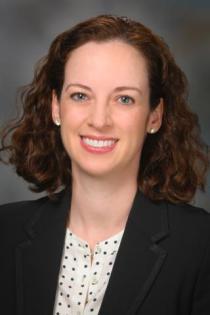
Dr. Lauren Byers is a rising star in the field of lung cancer research.

Research Underway to Improve Immunotherapy Outcomes for ALK-Positive Lung Cancer
In the past decade, researchers have identified many types of lung cancer, including ALK-positive lung cancer, a subset of non-small cell lung cancer (NSCLC) resulting from the fusion of the ALK gene with another gene (usually EML4). It is found in about 5% of NSCLCs.

Finding Hope in Emerging Therapies
In 2017, I was a medical resident. I heard from more senior residents in my Oral and Maxillofacial Surgery (OMFS) program that you could have a normal life in the five months of the anesthesia rotation. It seemed like perfect timing because I started having soreness in my back around the same time; I figured with all this extra time I would have on anesthesia, I could start hitting the gym again to work on my six-pack.

The Role of Molecular Pathologists in Lung Cancer Treatment: Q&A with Dr. Dara Aisner, MD, PhD
Comprehensive biomarker testing is the first step for advanced-stage non-small cell lung cancer (NSCLC) patients to secure personalized and specific information about their cancer to gui

Pulmonologists: Trusted Guides on the Lung Cancer Journey
Anil Vachani, MD, a member of LUNGevity’s Scientific Advisory Board, routinely sees patients who are suspected of having lung cancer. As a pulmonologist, or lung disease specialist, in the thoracic oncology program at the University of Pennsylvania, he is often the first doctor his patients see after an abnormality has been detected on their lung CT scan or X-ray.

“Intercepting” Lung Cancer Before it Gets Going: Why Early Detection Matters!
Yay! It’s November again and I get to write the first science blog for Lung Cancer Awareness Month. And what’s more interesting and important than early detection of lung cancer?

A Solid Step Toward the Early Detection of Squamous Cell Lung Cancer
Dr. Joshua Campbell has been immersed in the field of lung cancer for several years and wanted to find a better way to diagnose squamous cell lung cancer patients, a subtype of non-small cell lung cancer, while the cancer is in early stages. “There is a huge need for research in this area,” he notes. “Improving early detection techniques will be key to improving survival rates for patients with squamous cell lung cancer.”









